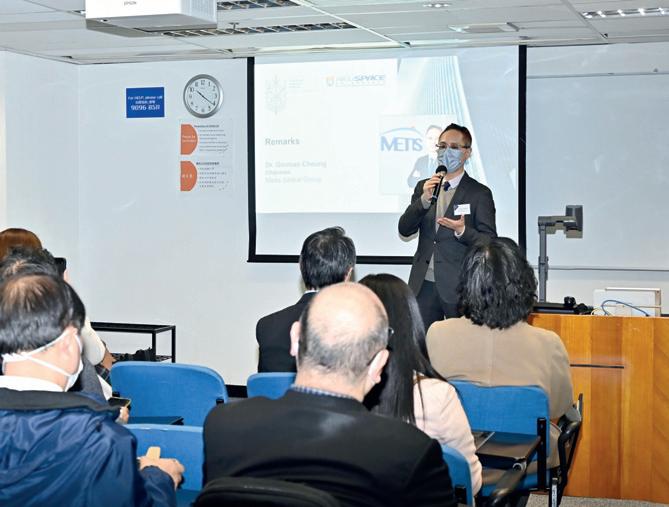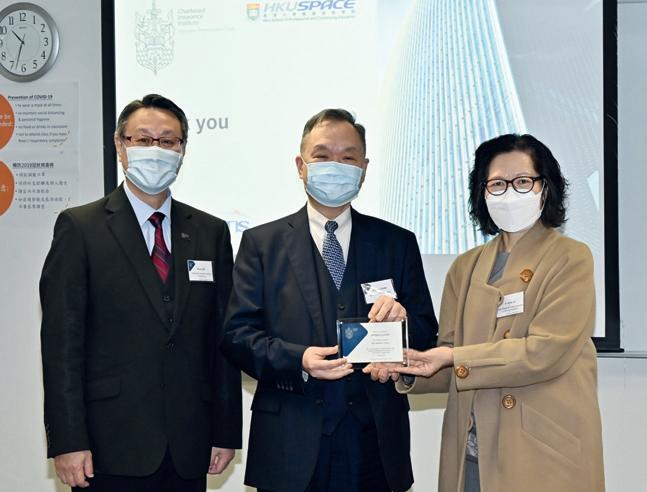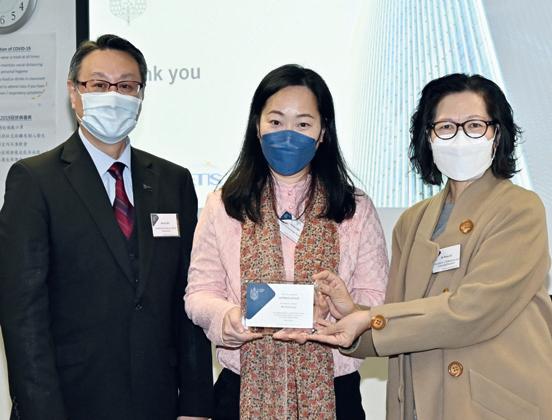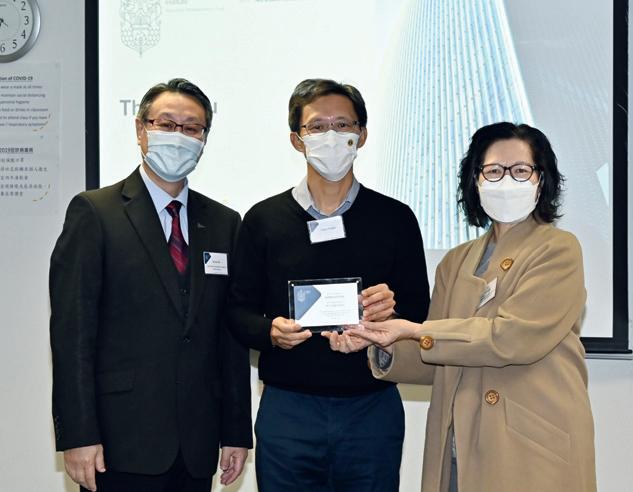thejournal.cii.co.uk

February – March 2023



TALENT TRAILBLAZER
Duty Bound Firms make strides to meet the Consumer Duty
Flexible future Can embedded insurance drive major growth in the sector?





Positive change How the profession is making progress towards net zero

 Samantha Ridgewell is leading the charge to attract fresh talent into the insurance profession
Samantha Ridgewell is leading the charge to attract fresh talent into the insurance profession
Connections that matter




Learn from others or give back. With Connect the choice is yours.
In 2023 we’re growing the number of mentees AND mentors on Connect. Find your perfect match.




ii.co.uk
Start your journey at c
C O NTENTS
5 President’s opinion
Russell Higginbotham salutes CII members helping to build trust in the profession
6-13 News


UK and international news from the CII
23 Regulation
The latest regulatory updates from the UK

FEATURES
14-16 Regulation
The insurance profession prepares for the Consumer Duty this July
17-19 Ukraine

The impact of the war on insurance markets across the world
20-22 The Interview
Samantha Ridgewell on how the insurance profession can make strides to attract talent

24-25 Technology
Can embedded insurance trigger growth in the market?
26-28 ESG
Examining the sector’s progress towards net zero




30-31 Data
The big data ethics challenges for insurers in 2023
CONTACT US
32-33 Motor
The latest regulatory advances on autonomous vehicles







34-35 Advice process
Why curiosity is key for brokers and underwriters

42-43 Talent
Is insurance becoming a career of choice?
SECTOR SPECIAL
36-37 Claims
The latest focus of the claims community
38-39 Claims in 2023
How to be a better claims professional this year
40-41 Insurtech
What new tech disruptors can offer the claims sector
STUDY ROOM
29 Learning
Flexible ways to meet your CPD requirements

46-47 Education
Success stories of the CII partnering with universities
49 The Big Ten Test your knowledge
50 CII blog
Professional benefits of building confidence
The Chartered Insurance Institute 20 Fenchurch Street, London EC3M 3BY
The Chartered Insurance Institute 20 Fenchurch Street, London EC3M 3BY





Tel: (020) 8989 8464
Tel: (020) 8989 8464
The Journal is online at www.thejournal.cii.co.uk
The Journal is online at www.thejournal.cii.co.uk
The Journal is the official magazine of the Chartered Insurance Institute (CII). Views expressed by contributors or advertisers are not necessarily those of the CII or the editorial team. The CII will accept no responsibility for any loss occasioned to any person acting or refraining from action as a result of the material included in this publication.
The Journal is the official magazine of the Chartered Insurance Institute (CII). Views expressed by contributors or advertisers are not necessarily those of the CII or the editorial team. The CII will accept no responsibility for any loss occasioned to any person acting or refraining from action as a result of the material included in this publication.
The Journal is online at www.thejournal.cii.co.uk
Cover Image: Xxxxxxxxxx
Chief executive: Sian Fisher
CEO: Alan Vallance
EDITORIAL
Editor: Luke Holloway (020) 7417 4778 luke.holloway@cii.co.uk
Editor: Luke Holloway luke.holloway@cii.co.uk
Contributing editor: Liz Booth
Contributing editor: Liz Booth
DESIGN
Art editor: Yvey Bailey
Art editor: Yvey Bailey
Picture editor: Claire Echavarry
Picture editor: Claire Echavarry
Production: Jane Easterman
Printing: GD Web Offset
Cover Photo: Richard Lea-Hair
Production: Jane Easterman
Printing: The Manson Group
-
Redactive Publishing Ltd 9 Dallington Street, London EC1V 0LN
PUBLISHER
Redactive Publishing Ltd., 9 Dallington Street, London
EC1V 0LN
For sales and advertising please contact us on cii-sales@redactive.co.uk or 020 7880 7661
ISSN 0957 4883
For sales and advertising please contact us on cii-sales@redactive.co.uk or 020 7880 7661
© 2022 Chartered Insurance Institute Recycle your magazine’s plastic wrap – check your local LDPE facilities to find out how
ISSN 0957 4883
© 2022 Chartered Insurance Institute
FEBRUARY - MARCH 2023
3 thejournal.cii.co.uk / The Journal
/ February
March 2023
24 38 26 20 17
NEWS
Discover our new Product Simplification courses
Improving customer outcomes with product simplification

Following increased demand for simplified products from consumers and the FCA, the Chartered Insurance Institute has collaborated with Lloyd’s and the Lloyd’s Market Association to create two new introductory level Product Simplification courses. The courses introduce the use of Design Thinking as a framework to help improve customer outcomes within almost any role or function from product design and policy wording to marketing, customer service or distribution.
Product Simplification: Product Design looks at how to revise approaches to the design and development of products and product documentation.
Product Simplification: Sales and Distribution helps to revise approaches to the design and development of sales and distribution processes.
Key features
• 1 hour study time
• 1 hour of CPD accreditation
• Courses delivered via online module
• Completion certificate issued after successful course completion
For more information visit our webpages below:
Product Simplification: Product Design
www.cii.co.uk/learning/product-simplification-product-design
Product Simplification: Sales and Distribution
www.cii.co.uk/learning/product-simplification-sales-and-distribution
For business enquiries, email: business.enquiries@cii.co.uk
OUR PROMISE
CII president, Russell Higginbotham examines why trust is crucial to the insurance profession delivering for its customers

customers today and many years, often decades, into the future. Conduct regulation ensures that we deliver our products, services and solutions in a professional way and to the right standard. So, the next time you have a moan about regulation, try to keep this in mind.
BUILDING TRUST
We aspire, as professionals working in the insurance sector, to be held in a similarly high regard as doctors and teachers. So, how do we get there? As, very clearly, we are not there yet.
Insurance is an intangible. It’s a promise, usually to pay, or make right, when the unexpected or the worst happens. As such, to a large extent, it is based on trust. Trust that when something happens, we will be there to help, repair, resolve and provide comfort.
How is this trust built up? Past experiences, what you hear from friends, colleagues, what is said in the media and so on. But also, in the belief that insurers are financially strong, robust and well-run institutions. In this sense, it is having the strong belief that no matter what happens, your insurer and your adviser will be there to help when a claim comes. This ‘corporate resilience’ is a key part of the insurance landscape – how can we help provide societal resilience if we’re not resilient ourselves?
Regulation provides a key role in enabling this trust. While we might like to complain about increasing regulatory burdens, having strong regulation is an important part of providing this assurance to our customers. Prudential regulation ensures that we price, design products, monitor, reserve and control our business in an appropriate and consistent way, to enable us to meet the promises we make to our
It is all about building that trust. It is hard to do. It takes time. It takes good quality, consistently delivered. It takes good experiences for our customers when they are in difficulty. It takes strong regulation too. And the flipside is that while it takes a long time to build up, it can be destroyed or damaged quite easily.
The CII is here to play its part in all of this. Having well-qualified people working across the sector, who continuously invest in their knowledge and career, is one of the most fundamental aspects of building trust with our customers. Whether we meet them face to face, work to develop the products they buy, process their business or pay their claims, we are all representatives of the profession and all have a role to play in this trust-building.
If you’re reading this, you are clearly well on your way and already doing your bit. So, thank you! Spread the word, encourage your friends and colleagues to follow your example. It is a long journey and probably a bumpy road, but we’re all passionate about making the insurance sector the best it can be. ●
5 thejournal.cii.co.uk / The Journal / February - March 2023 PRESIDENT’S OPINION RUSSELL HIGGINBOTHAM
Russell Higginbotham is president of the CII
ILLUSTRATION: MATTHEW BRAZIER
WHILE WE MIGHT LIKE TO COMPLAIN ABOUT INCREASING REGULATORY BURDENS, HAVING STRONG REGULATION IS AN IMPORTANT PART OF PROVIDING THIS ASSURANCE TO OUR CUSTOMERS
@YutreeUW
@JamesHallamUK
@AstonLark
FROM THE CII TWITTERATI »
In her role as chair of the @brokingsociety, Yutree Director Laura Hancock joined @CIIGroup Radio to discuss how brokers and underwriters can benefit from the FCA’s Consumer Duty regulations
We are pleased to announce that our Chartered Insurance Broker status has successfully been renewed for another year by @CIIGroup
#ChooseChartered
Suzi Rackley, Client Director, features in The Journal from the @CIIGroup, sharing insights alongside fellow SIB Board members on how to support clients & staff during the cost-of-living crisis TALENT
CII LAUNCHES APPRENTICESHIP AWARDS
The CII is inviting nominations for its inaugural Apprenticeship Awards. These prestigious awards will celebrate the achievements of exceptional apprentices from across the UK in seven categories –including three from the general insurance profession – with winners receiving cash prizes of up to £1,000 funded by the CII’s Education and Training Trust.
The CII Apprenticeship Awards are open to all apprentices in England, Northern Ireland, Scotland and Wales that meet the awards criteria, which include achieving a CII qualification as part of successfully completing an apprenticeship standard or framework. Nominations are welcome from employers, training providers and apprentices themselves.
The general insurance categories are:
● Insurance Practitioner Apprentice of the Year – Level 3 (£500)
● Insurance Professional Apprentice of the Year – Level 4 (£800)
TALENT
● Senior insurance Professional Apprentice of the Year – Level 6 (£1000) Announcing the awards, CII president, Russell Higginbotham, said: “I am delighted to launch these new awards, which build on the great success of other programmes we already run to encourage young people to join the insurance and
CII NEW GEN GROUP PARLIAMENT VISIT
This year’s participants in the CII New Generation programme visited the Houses of Parliament in February. As part of the CII’s flagship talent programme, the 2022/2023 group heard from Craig Tracey MP, Flora Hamilton of the CBI and Lord David Hunt of the Wirral, who spoke to the young insurance professionals about campaigning, lobbying and how to engage with MPs.


personal finance professions, including our Next Gen initiative. I hope employers, training providers and apprentices themselves are excited to enter these awards and see them as a prestigious acknowledgment of the time, energy and hard work they invest in studying for their CII qualifications and broader apprenticeship.”

Winners will be presented with their awards at an event to be held later in the year.
Nominations are now open and will close on 12 May 2023.
→ To enter, visit: https://forms.office. com/e/Dawu1bV2Lk or scan the QR code to the right.
6 NEWS thejournal.cii.co.uk / The Journal / February - March 2023
Craig Tracey MP Lord David Hunt meets the New Gens
@ClaimsMedia
We’re thrilled to announce that Alan Vallance from the Chartered Insurance Institute is joining the British Claims Awards 2023 independent judging panel
@HineInsurance
Congratulations to Patrick McCahon at @MarshGlobalthis year’s winner of the @CIIGroup’’s David John Hine Memorial Prize
@LMAupdates
Andrew Oakley, Head of LMA Academy, recently spoke with Ian Simons, Customer Director at the @CIIGroup, to discuss the newly released Product Simplification courses designed by CII and LMA
20,230
Followers and counting...
CII company 88.9k followers
CII Group 50.2k members LEARNING
CII PILOTS NEW FORM OF FINANCIAL PLANNING ASSESSMENT
The CII is piloting a new form of assessment for the R06 Financial Planning Practice unit.

The Shaping the future together consultation gave members and other key stakeholders the opportunity to feedback on the CII’s proposed plans, as well as the services it delivers and how the professional body can best meet their needs and expectations in the future.
The format of the coursework assessments for R06 will be assignments based on client case studies.
Gill White, chief customer officer at the CII, said: “Our R06 unit currently uses on-screen written exams available four times per year. We are piloting a flexible, client-focused coursework assignment assessment, designed to fit in with contemporary working practice. This means learners with commitments that prevent attendance of exams on
the fixed dates will not face a barrier to completion of the Diploma in Regulated Financial Planning.
“The assessment is designed to meet the same syllabus learning outcomes and assessment criteria as the current R06 exam and meets the Level 4 qualification descriptors set out by education regulators. The assessment criteria include a requirement for analysis and justified recommendations, which are appropriate to assess in longer responses such as case study-based assignments.”
A review will be undertaken later this year once the pilot is completed and feedback from candidates has been received.
The CII will then decide during 2023 whether assessment for the R06 Financial Planning Practice unit will switch from written examinations to coursework, and the timetable for any changes.
CHARTERED INSURANCE INSTITUTE

JOHN BISSELL TO RETIRE FROM CII
John Bissell will be retiring from his role as chief operating officer and CII Board member in early April 2023, after more than six years with the organisation.

During this period, he has also been director of CII Hong Kong, CII Middle East, CII Enterprises and a trustee of the CII Prize Fund. After a short break, Bissell intends to extend his non-executive
director and trustee portfolio.
Alan Vallance, CII Group CEO, said: “I would like to thank John for supporting me during my first six months in post. He is a respected, long-standing servant of the CII and we wish him well for the future.”
Plans are currently being developed to cover Bissell’s responsibilities both in the short and longer-term.
7 thejournal.cii.co.uk / The Journal / February - March 2023
Twitter
@CIIGroup
NEWS
APPOINTMENTS

CII ANNOUNCES NEW CHAIRS FOR BROKING AND CLAIMS SOCIETIES

The CII has announced the appointment of new chairs for two of its specialist communities, the Society of Insurance Broking (SIB) and the Society of Claims Professionals (SOCP).

Laura Hancock, director of YuTree Insurance, replaces Kevin Hancock, also of YuTree, as chair of the SIB, while Ashton West OBE, non-executive director of Weightmans and director of Fidu Consultancy, succeeds Sue McCall of MS Amlin as chair of the SOCP. Chair appointments are made on a biennial basis and come following the natural completion of their predecessors’ cycles.
Hancock, who brings significant previous board experience, said: “It is an honour to have been given this opportunity and I will work tirelessly to ensure that I make a difference to the work that the wider CII does, as well as to the individuals in the broking
community that this board seeks to support.”
West brings broad experience from 15 years as chief executive of the Motor Insurer’s Bureau, as well as just over five years as a non-executive director of the Insurance Fraud Bureau, while he currently chairs the board of trustees for The Road Safety Trust charity.
West said: “Having served as a board member on the Society of Claims Professionals for the last two years, I was honoured to be nominated as the new chair by my fellow board members. It is an exciting time to be a part of the CII’s specialist claims community board. All of the board members bring a wealth of different experience and are
passionate about finding ways to add value to our members who work in the claims profession, and we look forward to sharing more on this shortly.”
Read the article from Ashton West in our special claims section on page 36 of The Journal












INSURANCE MUSEUM LAUNCHES SECOND GALLERY
‘Fuelled by Coffee’ is the second in a series of online galleries from the ‘Fire! Risk and Revelations’ exhibition by the Insurance Museum.

The first gallery, ‘Rising from the Ashes’ launched earlier this autumn and told the story of the birth of fire insurance back in 1667 following the historic Great Fire of London, which was instrumental in highlighting the need for fire insurance.
‘Fuelled by Coffee’, which is now live, will focus on the newly formed insurance companies that proliferated in the early 18th century, and is inspired by how important English coffee houses were to network, debate and conduct business,
including the renowned Lloyd’s Coffee House.
It will feature video interviews with industry experts, interesting facts and a focus on fascinating objects from archives and museums, to illustrate how fire insurance developed through the years.
The Insurance Museum aims to inform
and educate about the history of different areas of insurance through various exhibitions, with the first – ‘Fire! Risk and Revelations’ – focusing on fire insurance.
Through further support and funding from the industry, the plan is to produce further exhibitions, a popup museum with educational facilities and, ultimately, a permanent museum to be based in the heart of the City of London.
→ Visit the new museum here: www. insurance.museum/fuelled-by-coffee
→ To find out more about getting involved with the museum, visit: www.insurance.museum/membership

8 NEWS thejournal.cii.co.uk / The Journal / February - March 2023
HISTORY
Laura HancockAshton West
CII RADIO LAUNCHES SEASON 10

The CII’s podcast channel, CII Radio, has launched its 10th season.



The channel – hosted by The Journal website – invites industry experts to discuss a array of themes from across the insurance profession as well as give CII members and the wider insurance sector an insight into the work of the professional body.



This series features episodes including ‘The benefits of Apprenticeships’, ‘What the Consumer Duty means for brokers and underwriters’, ‘Meeting the CII President for 2023’ and ‘LGBT+ History Month’.


The podcasts are also available to Android users via SoundCloud, Stitcher Radio or via Apple.
To listen to the latest season and access a complete library of previous episodes, visit: thejournal.cii.co.uk/podcasts
FCA SUPPORTS FIRMS THROUGH TRANSITION TO IMPLEMENTING THE CONSUMER DUTY
As firms continue to get ready for the implementation of the Consumer Duty, the Financial Conduct Authority (FCA) is supporting firms through the transition with a programme of engagement, which includes setting out in letters the expectations of the Duty and arranging a series of regional in-person events for specific groups of small and medium-sized firms.
Sheldon Mills, executive director of consumers and competition at the FCA, said: “We want to thank firms for the hard work they’re putting into embedding the Duty. We were encouraged to see many examples of good practice in our review of implementation plans and found that many firms are embracing the shift that the Consumer Duty brings.
“Putting good outcomes for customers at the heart of firms’ strategies and business objectives will build trust and modernise how we regulate financial services.
“Leaders have a key role to play here. We have a world-leading financial services industry that serves its customers, colleagues and shareholders well through competition, innovation and leveraging talent. We want to see boards and senior management further embed the interests of customers into their firms’ culture and purpose.”
Read the article on the Consumer Duty on page 14 of The Journal

 ALAN VALLANCE, CEO
ALAN VALLANCE, CEO

EXCITING FUTURE
The CII will launch its new five-year strategy later this month which will guide the long-term direction of our organisation. We have leveraged last year’s member consultation in its development, alongside expert input from colleagues, our volunteer network and the wider insurance and personal finance professions. The strategy will renew our vision and purpose, identify our key strategic goals and challenges and set out the initiatives we will deploy to further the Institute’s position as a global professional body, ensuring members’ interests are at the heart of everything we do.
I hope you will agree that an excellent example of that emphasis is our work to encourage more young people to join the insurance and personal finance professions – and then to help nurture them. Our New Generation programme has for many years been successful in helping those early in their careers to shine and I am delighted that we are now able to launch our new Apprenticeship Awards for those taking their first steps. If you’re a member with an apprentice, do please consider entering them for these prestigious awards.
Alongside these and other exciting developments, I know there is still much work for us to do to improve our overall member experience. Our focus during the remainder of 2023 will be to build the solid process and system foundations that will enable us to offer improved quality of service and products. A significant step in their construction will come later in March, with our transition to a new customer and member relationship management system that will mean we can provide more streamlined, tailored communications, alongside relevant continuing professional development (CPD) programmes and events.
And talking of events, one activity that the CII Group Board and Executive Leadership Team will doing in the next few months is getting out and about to visit our local insurance institutes and PFS councils. Our CII president, Russell Higginbotham, wrote in the last edition of The Journal about the importance we place on the work undertaken by volunteers to bring our communities together through CPD, lectures, learning and social activity. Having two professional membership bodies under one roof is a unique benefit to our group and gives us the potential to leverage a wide range of knowledge and expertise for the benefit of more members.
I hope to see you at one of those events soon.

9 NEWS thejournal.cii.co.uk / The Journal / February - March 2023
REGULATION
PODCASTS
ILLUSTRATION: MATTHEW BRAZIER
FIRST PROFESSIONALS COMPLETE LEAD PROGRAMME















In collaboration with the University of Hong Kong School of Professional and Continuing Education, the CII has launched the Learning Enhanced and Development (LEAD) programme in Hong Kong.


More than 250 insurance and financial professionals in four cohorts completed the programme and gained understanding of core knowledge of insurance and financial planning principles, while further developing their understanding of insurance contract law, insurance business and finance and risk management.

The accomplishment recognition ceremony for the first four cohorts took place in January 2023.


INTERNATIONAL AFFILIATED INSTITUTE FORUM






The CII hosted an International Affiliated Institute Forum in January. The forum discussed the importance of professional membership to support the sector and drive rising standards while working together to promote professionalism.
Representatives from the Asia Pacific region included the Indonesia Insurance Institute; Malaysian Insurance Institute; Insurance Institute for Asia and the Pacific; Philippines Singapore Insurance Institute; and Taiwan Insurance Institute.



10 INTERNATIONAL NEWS thejournal.cii.co.uk / The Journal / February - March 2023
ASIA PACIFIC
LEARNING
o
IONALS
CII HONG KONG WELCOMES PROFESSIONALS
Kenny Siu, regional director of Hong Kong & Asia Pacific and the CII team continue to support young talent in the insurance profession by meeting with young professionals at the CII Hong Kong office.

LEARNING
CONTINUE TO DELIVER CPD COURSES AND WEBINARS



The CII is continuing to deliver CPD courses and webinars in the first quarter of the year, with topics including: business ethics and the trusted professional, risk management, marine risks, and trade credit insurance.

The courses are on offer to members and business partners in the Asia Pacific region.


→ To find out more, visit: www.ciigroup.org/apac
HONG KONG
TALENT DEVELOPMENT TALK TO UNIVERSITY STUDENTS
Alpha Ho, corporate development manager of CII Hong Kong & Asia Pacific, delivered a presentation on talent development in insurance and how CII qualifications can support the professionalism in the

THE CII WISHES MEMBERS HAPPY CHINESE NEW YEAR








Kung Hei Fat Choi!
The Chartered Insurance Institute wishes a year of good health and good fortune to all those who celebrate Chinese New Year.
To keep in touch with CII Hong Kong via LinkedIn, visit: www.linkedin.com/company/ciihongkong





industry to students from Lingnan University, Hong Kong.
The CII continues to work with universities to support talent development and nuture young talent in the profession.
pment

11 INTERNATIONAL NEWS thejournal.cii.co.uk / The Journal / February - March 2023
KONG
HONG
SHUTTERSTOCK
MEMBERSHIP
COMMUNITY MONTH A SUCCESS IN LEEDS
The Insurance Institute of Leeds held its latest themed continuing professional development (CPD) focus event during February, with its Community Month series of activities.
The Institute introduced its innovative ‘Changing World’ fortnight during the pandemic in 2020, offering a series of digital events looking at changes to insurance and attracting talent. That was followed by its Festival Week technology-themed webinars in 2021, while this year Leeds chose ‘Community’ as the focus.
Insurance Network, the ISC Group, the LGBTQ+ Network (LINK), and the Group for Autism, Insurance, Investment and Neurodiversity (GAIN). It was hosted by Institute past president Melanie Jordan and provided attendees with key insight into the latest EDI developments.
The Institute ensured members could join Community Month via webinar, while the session ‘Confident Communication for Women in Business’ by Susan Heaton-Wright was very popular, with more than 130 bookings.

During the month, a combination of digital and face-to-face CPD sessions provided members with engaging and current topics to further their learning and development.
Among the highlights was the in-person session ‘Champion Teams: Leadership and the Community’, led by former Rugby League star Jamie Peacock MBE. He provided a motivational talk exploring teamwork,

mindset and professional standards, taking the audience through aspects of leadership and wellbeing that enable a team to fulfil their potential and for everyone to be the ‘Champion version of themselves’. Attendee feedback was very positive, reflecting the appetite for more holistic topics as additional CPD support.
An equality, diversity and inclusion (EDI) panel discussion followed, featuring contributions from the African and Caribbean
Institute president, Holly Copsey, said: “We were delighted to be able to continue our innovative approach to CPD support for members and it is pleasing to see how members have embraced it. It is an engaging and effective addition to our programme, and we will use the feedback to ensure our activities and delivery continue to meet members’ development needs. My thanks go to our tireless council volunteers whose incredible efforts make possible this level of member support.” NORTHEAST
INSTITUTES FOCUS ON WELLBEING
The insurance institutes of the northeast have joined forces to offer a series of events across April and May to support members’ wellbeing in the workplace and at home.
Nutritionist and workplace health coach Anna Reddy, from Leap Health, will host four webinars focusing on various aspects of wellbeing and workplace or workspace welfare:

● WFH&H… WFH&H: Working From Home & Hybrid… Without Forgetting Health & Happiness – Tuesday 18 April
● Food for Mood – Tuesday 2 May
● Breaking Burnout – Tuesday 16 May
● Rest, Recovery, Recharge… Ready for Productivity – Thursday 25 May
With the working-from-home phenomenon showing no sign of letting up, and the associated challenge of finding the balance wellbeing and optimal productivity, these sessions promise a fascinating insight in to how to achieve the best outcomes – for you and your role.
All events are one-hour sessions and will take place between 12:00pm and 2:00pm on the stated dates. More information and booking can be found across the eight northeast institutes websites: Bradford, Halifax, Hull, Leeds, Middlesbrough, Newcastle upon Tyne, Sheffield and York.
12 REGIONAL NEWS thejournal.cii.co.uk / The Journal / February - March 2023 EVENTS AN OVERVIEW OF MOTOR TRADE INSURANCE → 12:00pm – 1:00pm Institute of Cardiff cii.co.uk/cardiff 07 MARCH BEHAVIOURAL ECONOMICS → 2:00pm – 3:00pm Institute of Lincoln cii.co.uk/lincoln 08 MARCH EXCEPTIONAL COMMUNICATION –BECOME A VITAL COMMUNICATOR → 12:00pm – 1:00pm Institute of Cheltenham and Gloucester cii.co.uk/cheltenham-gloucester 09 MARCH
LEEDS
Jamie Peacock MBE
HOW TO MAKE PROPOSALS
→ 12:30pm – 1:30pm Institute of Newcastle upon Tyne cii.co.uk/newcastle
LOCAL INSTITUTES
HAWKINS WEBINAR: THE NEED FOR SPEED: ESTIMATING SPEED IN COLLISION INVESTIGATIONS
→ 09:30am – 10:15am Institute of Chelmsford and South Essex cii.co.uk/chelmsford
CYBER INSURANCE
→ 12:00pm – 1:00pm
Institute of Luton and Hertfordshire cii.co.uk/lutonhertfordshire
OBITUARY
INSTITUTE AGMS –AN OPPORTUNITY FOR YOU TO FIND OUT MORE
LOCAL
Your local institute annual general meeting (AGM) will take place between March and May. AGMs are a really useful introduction to what your institute is about, what its plans are for the year ahead and an opportunity to meet the volunteers who make up the council that provides your local support programme. Institutes will always welcome and encourage new faces and new ideas to council. It’s a great way to expand your professional network, use your skills and experiences to support members, as well as to learn new skills yourself.
Sophie Godbold is a council member for the Insurance Institute of Ipswich, Suffolk and North Essex: “Being a council member of the Ipswich, Suffolk and North Essex CII local institute for the past few years has been such a valuable experience. Getting involved in my local council has given me the opportunity to connect with likeminded people in the industry that I wouldn’t connect with otherwise.
THOMAS WAKELING
The Insurance Institute of Cambridge was saddened to learn of the recent passing of one its longstanding members, Thomas Wakeling.
Mr Wakeling was a supportive member of CII Cambridge, as well as the founder and director of Halstead Insurance Brokers, Mill Road, Cambridge.
@DACBclaims
“The council brings together underwriters, brokers, loss adjusters and PFS members from all different job roles, and we work collaboratively to put on events for CPD and social events, while also engaging with local firms and schools highlighting the profession, alongside planning large events such as our annual dinner,” she said.
“This is such a rewarding process, knowing that we are helping our local members connect and provide valuable resources and training that will benefit their career and inspire the future generation. Not only does this benefit our members, but volunteering leads to gained skills and experiences beyond what you may already have in your dayto-day job role, alongside networking and gained relationships. I cannot recommend enough reaching out to your local institute if you are thinking of getting involved. It’s a valuable experience that both you and local members will get a lot from.”
We had a fantastic time attending The Insurance Institute of Northern Ireland’s Annual Gala Dinner on Friday night! Thank you @CIIGroup #insurance

@YorksFSAwards
Holly Copsey, president of the Insurance Institute of Leeds, is the latest addition to the Yorkshire Financial Awards 2023 independent judging panel #YFAwards
@CIIReading
Announcing our Achiever Award 2023 to be awarded at our 90th Annual Dinner on Friday 24 March 2023! Open to anyone in the insurance market locally
13 REGIONAL NEWS
/ The Journal / February - March 2023
thejournal.cii.co.uk
15 MARCH
16 MARCH 22 MARCH
Council members, Insurance Institute of Ipswich, Suffolk and North Essex
DUTY BOUND
With the profession now halfway to implementation of the Consumer Duty, Dr Matthew Connell provides an update

thejournal.cii.co.uk / The Journal / February - March 2023 REGULATION
14
CAMERON LAW IKON IMAGES
The UK Financial Conduct Authority’s (FCA) launch of the final Consumer Duty rules and guidance in July 2022 was greeted with a huge amount of interest. It was the first major piece of regulation to come out after the pandemic and significantly increased the scope of conduct regulation, especially in the areas of communication and service for consumers.
Although the launch of the Consumer Duty rules feels relatively recent, we are already halfway along the road to implementation for all products and services that are on sale or open for renewal. Firms must be fully compliant for these products and services by July 2023. By July 2024, the Duty will apply to all closed products and services.
At the end of January, the FCA published an overview of progress based on a range of financial services firms and at the beginning of February, it sent a letter to general insurance firms to talk specifically about implementation in this sector.
REGULATION
WHERE FIRMS SHOULD BE NOW
In July 2022, the FCA said it expected firms to have an implementation plan ready by the end of October. Although this plan did not have to be an exhaustive list of actions needed to comply with the Consumer Duty, it needed to address the four key consumer outcomes:
● Products and services.
● Price and value, whereby “firms should avoid designing products and services to include elements that exploit consumers’ lack of knowledge and behavioural biases to increase the price paid”.
● Consumer understanding.
● Consumer support – this requires firms to “enable consumers to get what they paid for… without unreasonable barriers”. As we move into the second half of the implementation period, it is important for firms to:

● Have evidence that they have considered what they need to do to meet the new standards.
● Have documented who is carrying out specific actions to meet those standards.
● Show how far along they are to completing those actions.
PRODUCTS AND SERVICES
For products and services, a useful place to start is the Product Intervention and Product Governance Sourcebook (PROD).
The FCA has said: “The existing PROD 4 rules, where implemented correctly, will mean firms in these sectors will already be meeting the requirements of the Duty’s products and services, and price and value, outcomes.”
As a result, a review of a firm’s existing compliance with PROD rules is an essential part of preparing for the Consumer Duty. The review could be based on this high-level steer from the FCA: “A key part of the Duty is that firms are able to define, monitor, evidence and stand
behind the outcomes their customers are experiencing… This monitoring must enable firms to identify where customers, or groups of customers, are experiencing poor outcomes and, where this is the case, firms must take appropriate action to rectify the situation.”
Where firms can show that they have considered their responsibilities under the PROD rules in the run-up to the consumer duty, and they have taken action to ensure that they are monitoring consumer outcomes and acting on what they see, they can be confident that they are in a strong position to comply with the products and services element of the Consumer Duty.
PRICE AND VALUE
The price and value element is likely to be a more demanding challenge for firms. The FCA has said: “We have seen some firms take a tickbox approach to fair-value assessments… We would expect fair-value assessments to include an analysis of data that results in considered commentary and a conclusion as to whether the product provides fair value. The mere restatement of data such as loss ratios, claims frequencies, specified target markets and distribution methods without analysis, context and a conclusion would not, in our view, be sufficient to deliver an adequate assessment that a product provides fair value.”
The key evidence that general insurance firms need to be ready to present for the price and value element of the Consumer Duty is:
● Price
● Loss ratios
● Services that add value – for example, a health insurer providing customers with a service to help them select a consultant.
● Instances where a firm has changed the price or features of a product, or taken it off the market altogether as a result of its analysis.
thejournal.cii.co.uk / The Journal / February - March 2023 15
ONE QUESTION FIRMS CAN ASK THEMSELVES IS WHETHER THEY ARE APPLYING THE SAME CONSUMER SUPPORT STANDARDS TO DELIVER GOOD CONSUMER OUTCOMES AS THEY ARE TO GENERATE SALES AND REVENUE
CONSUMER UNDERSTANDING
The consumer-understanding principle will also require thought and attention from firms. The FCA has made it clear that this does not mean firms must “verify that all individual consumers have in fact understood the information provided”. However, it does expect firms to “test, monitor and adapt communications to support understanding and good outcomes for customers”.
For GI firms, the FCA has also highlighted three specific expectations:
● Communications advising customers on how to cancel their policy or complain should be at least as clear as those used to sell the policy.
● Where firms conduct consumer testing of communications to maximise sales, they should use equivalent testing capabilities to assess the other aspects of consumer understanding to ensure good customer outcomes are achieved.
● Any cancellation fees, administration fees or other charges should be clearly signposted. This information should not be spread out across different webpages and policy documents, summaries and covering letters.
CUSTOMER SUPPORT
Finally, the customer support element is a key part of the Consumer Duty and arguably expands the scope of FCA regulation further than any other aspect of the principles and rules.
The FCA has highlighted some specific claims lessons from Covid-19 that it would like GI firms to consider, where firms had not always:
● Produced clear and robust conduct management information, which affected their ability to identify and address delays in the claims process.
● Kept records of policy wordings that were easily accessible for claims handlers, which resulted in delays for customers.
● Adequately identified vulnerable customers or took an inconsistent approach in dealing with the needs of vulnerable customers.
● Tailored customer communications to the recipient.
Given the importance of vulnerability in delivering good outcomes on consumer understanding, it is important that firms of any size ensure that they have access to diverse perspectives on consumers’ experience.

As Sheldon Mills, executive director of consumers and competition at the FCA, said recently: “Progress on making financial services, including the insurance industry, representative of the country and communities it serves remains at best uneven and, at worst, stagnant.
“Diversity and inclusion is a two-sided problem: first,
internal representation within our organisations; and second, externally, sufficient knowledge and understanding so that we can serve our diverse society well. That isn’t just about race or a gender debate, it’s also about social mobility, class or levelling up – ensuring that we serve all communities. And many of those things intersect with each other.”
The Consumer Duty covers every aspect of firms’ contact with clients, so preparing for compliance can be daunting. However, if firms think carefully about every aspect of the Consumer Duty and take steps to address the issues raised, they will be in a much stronger place to show that they have complied with its principles by July this year. ●
Dr Matthew Connell is director of policy and public affairs of the CII
thejournal.cii.co.uk / The Journal / February - March 2023 REGULATION
16 Source: FCA
27 July 2022: Final rules and guidance published 31 October 2022: Firms agree implementation plans 30 April 2023: Manufacturers complete reviews to meet the outcome rules 31 July 2023: Rules start for open products/ services 31 July 2024: Rules start for closed products/ services 12345
KEY MILESTONES
UKRAINE: ONE YEAR ON
















Russia’s invasion of Ukraine has had far-reaching consequences for the world as a whole, including the insurance market, as Liz Booth reports
















When Russia invaded Ukraine on 24 February 2022, it set off a chain reaction across the world, not least in the insurance markets.
Apart from insured damage to buildings from the war itself, there were ships trapped in ports now under Russian control, a sudden ceasing of trade (particularly for food crops such as wheat and sunflower oil), a dramatic impact on European energy supplies and sanctions against Russia that caused the insurance industry to withdraw cover. →


thejournal.cii.co.uk / The Journal / February - March 2023 17 UKRAINE
Sadly, one year on, the war continues and as the UN reports that currently more than 7.5 million people have fled Ukraine and nearly seven million Ukrainians are internally displaced, it is still unclear what the further long-term consequences will be.
At the start of the war, the insurance profession immediately braced itself for substantial losses – forecasts of about $20bn (£16.5bn) were widespread.
Many predicted that the worst losses would be suffered in the first quarter after the invasion, as the insurers adjusted to the new environment.
In the event, S&P reported that the global insurance industry disclosed roughly $1.3bn (£1bn) in collective losses and reserve charges related to the Russia-Ukraine war in the first quarter. It found insurers and reinsurers in Europe were hit particularly hard, with some signalling that losses may impact future earnings as well as incurred-butnot-reported reserve holdings as the situation escalates.
But what is the situation one year on?
According to a Verisk expert speaking last year, likely claims totals from the war in Ukraine may have risen to about $26bn (£21bn) from guesses possible early in the conflict.
The Organisation for Economic Cooperation and Development (OECD) has pegged overall losses a little lower, saying: “Initial losses for the insurance sector are materialising or expected to materialise mainly in specialty insurance lines, notably in aviation insurance, but some impacts have been felt in marine insurance and losses are expected to materialise in property, trade credit and political risk insurance.
“Losses in aviation and credit insurance stem from the imposition of sanctions and measures against Russia and related Russian responses.”





The OECD adds: “Damage to commercial property and infrastructure in Ukraine will generate losses, as many large companies will have purchased war or political violence coverage. The war is also increasing the level of cyber risk, with attacks already directed against Ukraine and Russia, along
with other countries, which may generate losses depending on the existence of coverage and the applicability of various types of exclusions.
“Recognising that the situation is uncertain, preliminary rough estimates suggest an overall industry loss of $20.6bn (£17bn) which, while large, is manageable for the sector, in line with the costs of a midsized natural catastrophe event.”
MYRIAD OF RISKS


Fitch Ratings’ Brian Schneider, senior director and global head of reinsurance, says: “The full extent of insurance and reinsurance losses stemming from the conflict between Russia and Ukraine remains a murky subject with many unknown factors,” but he remains confident that the war will prove to be a “contained risk” for the market.
Ratings agencies agree that the past year has given insurers time to add exclusions. For example, in January, Reuters reported that the commercial arm of French insurer AXA was reducing cover offered to aviation companies as it sought to protect the multibillion-euro business after heavy Ukraine-related losses.

















Broker Howdens warns that the Ukraine crisis “presents a myriad of risks to the sector – direct underwriting losses, rapidly rising prices, slower economic growth, financial market volatility and the potential for asset shocks – that are not altogether different to what occurred during


Covid-19 and the financial crisis”.

It adds: “But with direct investment and underwriting exposures limited overall, and with second-order effects in financial markets currently manageable, the sector is strongly positioned to support clients through this period of uncertainty.”
As war broke out, the marine sector was one of those most immediately impacted, with travel immediately suspended. Added to that, about 84 vessels remain trapped in Russia-controlled areas. Those vessels (unless freed by 24 February 2023) become total losses. Although many of them are local, low-value vessels, the market is bracing itself for claims of somewhere between $800m (£660m) and $1bn (£830m).

Since last February, marine insurers have been scaling back cover and, in January 2023, Reuters reported that the protection and indemnity (P&I) clubs American, North, UK and West were no longer able to offer war-risk cover for some liabilities in the region. The clubs are among the biggest P&I insurers, covering about 90% of the world’s ocean-going ships.


Broker Marsh, meanwhile, provides a breakdown by class of the impact on insurers and availability of cover.

18 thejournal.cii.co.uk / The Journal / February - March 2023 UKRAINE
ISTOCK
THE UKRAINE CRISIS PRESENTS A MYRIAD OF RISKS TO THE SECTOR –DIRECT UNDERWRITING LOSSES, RAPIDLY RISING PRICES, SLOWER ECONOMIC GROWTH, FINANCIAL MARKET VOLATILITY AND THE POTENTIAL FOR ASSET SHOCKS
→
Aviation and space

















Sanctions by the UK, EU and others prohibiting the supply of aircraft or parts to Russia as well as related financing or insurance, followed by a Russian expropriation of foreign-leased aircraft, have led to multiple aircraft stranded in Russia. This has resulted in significant aviation hull losses, which have already led to aviation hull war insurance rates spiking by approximately 200%, on average and underwriters re-examining coverage. The broader aviation insurance market may harden, further straining the aviation industry, which is struggling to recover from the impact of the pandemic. The aviation and space sanctions have also led to international insurance coverage for satellite launches and deployment being unavailable for Russian-built satellites and launch sites within Russia. Between 2017 and 2021, Russia accounted for about 16% of global launches.
$20.6bn
PRELIMINARY ESTIMATES SUGGEST OVERALL INSURANCE LOSSES OF $20.6BN
Source: OECD
Energy and power

The energy insurance market saw an immediate impact on its premium volume due to sanctions on Russian oil and EU attempts to reduce reliance on Russian energy. As of December 2021, Russia accounted for nearly 10% of world petroleum production. Germany and other EU members that previously bought Russian natural gas and oil are trying to line up alternative energy supplies, including possibly delaying original coal phase-out plans or revamping already shut-down coal power plants (when feasible). Meeting power demand may increase the need for new upstream energy investments and energy infrastructure outside of Russia.
Credit and political risk

Claims are beginning to emerge for Russian and Ukrainian trade credit, political risk, and structured credit policies issued before sanctions were imposed. More trade credit and structured credit claims for Russia were anticipated in the second half of 2022 and the first quarter of 2023. Political risk claims were expected from Russia in the fourth quarter of 2022 and through 2023.

Significant political risk claims for war and confiscation in Ukraine have emerged. Since late February, few –if any – new political risk or credit insurance policies have been available for Russia, Ukraine or Belarus.









Sanctions and supply chain


Sanctions and trade controls have significantly increased. While media reporting has focused on the aviation and marine industry, sanctions have impacted a large variety of goods and services being supplied to Russia.
D&O liability
The conflict has signalled a shift in corporate reactions to events that trigger moral/ethical decisions. More than 1,000 companies have announced they are leaving or voluntarily curtailing operations in Russia. ●
ISTOCK
thejournal.cii.co.uk / The Journal / February - March 2023 19 UKRAINE
Liz Booth is contributing editor of The Journal
The insurance profession can win the war for talent – but it needs to be bold and embrace new ways of engaging with the wealth of untapped talent that is out there.


That is the view of Samantha Ridgewell, managing director of Empower Development, learning and training specialist, insurance TikTok titan and all-round talent trailblazer.
“I would like to see the insurance industry find a balance of working flexibly that has the progression of young talent at its heart,” Sam tells us.
“The challenge now with remote working is that the pace at which we are training people has severely slowed down and enrolments in professional qualifications that are so important to development have fallen.”
As well as attracting diverse talent, the insurance sector must also make significant efforts to retain it, says Sam. “Companies need to have an environment where people feel like they belong. They need to keep their culture alive and moving forward,” she says.
“Times have changed and how people learn and interact has changed with it. We must offer
them the chance to engage with us in new ways, so people are aware of insurance as a career and everyone feels included.
“There are reasons why we have the war for talent and insurance needs to keep evolving the way it connects to those who are curious about learning more.”
BUILDING KNOWLEDGE
Five years ago, Sam launched Empower Development, aimed at helping insurance professionals achieve their training and certification goals while offering a range of tools, resources and guidance to help support CII qualifications.




With a background in insurance human resources, she found that building her own knowledge by studying CII exams helped her collaborate with the brokers and underwriters she dealt with every day. This naturally progressed to offering informal training to colleagues, before her role evolved into recruiting graduates and apprentices.
“I realised there was a gap in the market for new ways of training. Young people kept saying that when they studied A-Levels they had lots of varied learning resources and accessible content – but there was far less of that once they moved into professional qualifications.
TALENT CHAMPION →
THE INTERVIEW: KEN NORGROVE THE INTERVIEW: RUSSELL HIGGINBOTHAM 20
Luke Holloway finds out how Samantha Ridgewell is leading the charge to attract new and diverse talent into insurance
thejournal.cii.co.uk / The Journal / February - March 2023 THE INTERVIEW: SAMANTHA RIDGEWELL
THE INTERVIEW: SAMANTHA RIDGEWELL



DEVELOPING TALENT
Samantha Ridgewell, ACII, is founder and managing director of Empower Development.


CII AWARD
Empower Development won the CII Public Trust Award for Talent Attraction Initiative of the Year in 2022.
FUTURE LEARNERS
Sam is a member of the CII Qualifications and Learning Committee and a Liverywoman at the Worshipful Company of Insurers.

thejournal.cii.co.uk / The Journal / February - March 2023
21
“We began building the resources that young people not only want but expect nowadays. Bitesized on-demand videos and audio, subtitled tutorials and, more recently, learning translated into Arabic for international modules.
“Anyone who wants to study CII qualifications can, regardless of their circumstances or what kind of learner they are.”


Sam sits on the CII’s Qualifications and Learning Committee and, with her HR experience and ACII qualification, she offers input from both the user and the business perspective.
“The committee reflects on what the CII’s plans are strategically around learning and we put forward our own suggestions,” she tells us.
“The experience of the committee is so broad – from across the whole of financial services and academia at all different levels – and we aim to have a positive input so that the CII can help more professionals with learning and development.”
THE POWER OF SOCIAL MEDIA

Insurers are regularly using LinkedIn to recruit new talent nowadays, with some also venturing onto Instagram, but can new social media phenomenon TikTok be a powerful tool for attracting talent into the sector?
“For me, if we had more people from insurance and financial services on these platforms it would go a long way to solving the talent problem,” says Sam.
“I got on TikTok during lockdown. I made one short video about graduates applying for jobs – that got half a million views and I gained 11,000 followers from that one video, which I made in my kitchen after I put my kids to bed!
“I suddenly had an audience. At first, my videos were focused on tips for CVs, interviews and cover letters,








































but once they were interested, what they wanted to know was: where do I find jobs? The page then gradually transformed into ‘Insurance TikTok’.
“I talk about loads of subjects, from the fabulous historical buildings we insure and big underwriting risks, to Lloyd’s’ World Cup predictions – as well as the odd dance in front of the HMS Lutine bell at Lloyd’s – anything to spark people’s interest in insurance.
“At least 20 people that I know of are now working in insurance because they came via my TikTok,” says Sam. “I would love it if we could build up a whole trending feed of insurance professionals talking about their roles, their days, things they insure – it would really have an impact.”


DRIVING TALENT
Further projects Sam has launched take a slightly different tack to attracting talent.













Into Insurance – a scheme sponsored by the Worshipful Company of Insurers – is a free training course designed to help those entering the profession demonstrate the knowledge, skills and behaviour that organisations are looking for.




“The sessions look at things like understanding job descriptions, preparing for interviews, networking, building confidence and busting insurance jargon –so entrants get valuable practical support and something to put on their CV to illustrate their commitment and understanding,” she says. “There are already at least 70 people working in insurance that have come directly through that programme and we are running five more courses in 2023.”
The talent drives that Sam is central to are generating real-life results, as well as recognition from the across the profession. Empower Development won the Talent Attraction Initiative of the Year award at the recent CII Public Trust Awards, while the Women In Insurance awards recognised the Women with Presence programme with the Contribution to Gender Inclusion award in 2021, with Sam herself named Trailblazer of the Year.
“I am not a technical person,” says Sam. “I pride myself on understanding things and explaining them simply, then that openness and accessibility feeds into everything we do. The vision is to give everyone, no matter who they are, that extra support so they can thrive in a career in insurance.”
The talent is out there, now it is up to the insurance profession to go and get it.
Find Empower Development on TikTok @Empower.Development ●










Luke Holloway is editor of The Journal

THE INTERVIEW: KEN NORGROVE THE INTERVIEW: RUSSELL HIGGINBOTHAM 22 THE INTERVIEW: SAMANTHA RIDGEWELL
thejournal.cii.co.uk / The Journal / February - March 2023
ANYONE WHO WANTS TO STUDY CII QUALIFICATIONS CAN, REGARDLESS OF THEIR CIRCUMSTANCES OR WHAT KIND OF LEARNER THEY ARE
REGULATION UPDATE

Dr Matthew Connell examines the FCA’s paper on Finance for Positive Sustainable Change




The Financial Conduct Authority (FCA) published a discussion paper (DP) on Finance for Positive Sustainable Change on 10 February.









The paper looks at how issues around sustainability – including environmental, social and governance factors – can be addressed. It looks at three themes in particular:











● How sustainability is addressed through firms’ governance.

● How firms incentivise staff to promote sustainability.
● The competence of individuals within firms on sustainability issues.
The paper makes the point that sustainability is much wider than simply the drive to net zero for greenhouse gas emissions, and encompasses issues such as biodiversity, along with diversity and inclusion (D&I).




For example, the paper argues: “While many fi this area are currently focused on climate change, this DP seeks feedback on how fi with the breadth of sustainability topics, encompassing both environmental and social matters. A firm’s approach to D&I is one relevant area of focus. D&I can not only be a relevant social consideration, but also an enabler of good governance.”
The paper also suggests: “Consistent with the notion of a ‘social licence to operate’, our own Financial Lives Survey… found that as of May 2022, 79% of consumers thought businesses have a wider social responsibility than simply to make a profi














However, this does not mean the FCA has decided to impose more rules on fi sustainability. It says: “We will consider how we can better support the industry in this evolving field and whether there is a case for further
regulatory measures in the area of firm governance, incentives and competencies.”


















One area where the FCA is supporting work by the profession is through the UK’s Green Finance Education Charter, of which the CII is a signatory. The CII is involved in this process and will be reporting back to members throughout 2023.





























































CUSTOMERS IN FINANCIAL DIFFICULTY

In January, the FCA published guidance for insurance businesses dealing with customers in financial difficulty. The FCA has proposed that the guidance should cover “both retail and commercial customers of non-investment insurance policies”. The primary trigger is when customers contact an insurance fi because they are in financial diffi

The proposed guidance suggests that firms should:



Reassess the risk profile of the customer, for example where a motor insurance customer may have reduced their vehicle use. Consider whether there are other products the firm can offer that would provide appropriate cover at a price the customer can afford.
Adjust cover to take account of the financial change in the customer’s circumstances

Work with customers to avoid the need to cancel cover that is important to them, including helping them to understand the potential consequences of cancelling cover that is important
Finally, where a customer’s policy is being adjusted or cancelled as a result of financial difficulties, the FCA’s draft guidance says that firms should consider whether it is appropriate to require the customer to pay all the contractual fees or charges associated with
e FCA expects to publish a final policy paper in the second quarter of 2023.
Read our article on ESG on page 27 of Th

REGULATION 23 1
2
is
CII al x ma re chan dth of s assing bo firm’s an n lso es A i to ue to the secondquarter o members ed nesses nancial osed that both mers e er is firm difficulties. ests that f customer, of 2023. n The Journal Read our article on E is di l the CII thejournal.cii.co.uk / The Journal / February - March 2023
director of policy and public affairs of the
Customisation and a seamless customer experience are two advantages of embedded insurance, which is the latest trend that is shaking up the profession.
Market expert Laura Mullaney has championed embedded insurance, which involves selling relevant and personalised insurance at scale where and when customers need it the most. Current examples are buying travel insurance when purchasing flights or opting in for insurance
FLEXIBLE FUTURE

thejournal.cii.co.uk / The Journal / February - March 2023 TECHNOLOGY 24
Aamina Zafar examines embedded insurance, which some experts believe can drive growth in the insurance profession
cover on your new mobile phone. It enables any third-party provider or developer to integrate innovative insurance products into its customers’ purchase journeys effortlessly and at a low cost.
Mullaney, managing director of distribution at BGL Insurance, says: “Customisation and a seamless customer experience are two huge benefits of embedded insurance and companies in various industries are seeing it as a real opportunity. Presenting customers with a technology-led approach and with propositions that are relevant, easy to purchase and good value can increase brand satisfaction and loyalty, which can ultimately aid retention. Companies need to be careful though, as not every insurance product can and should be embedded. The add-on has to feel authentic and appropriate to the company’s core offering, otherwise you risk alienating customers.”
DRIVING GROWTH
Embedded insurance is proving to be so popular that news articles have reported it as having an estimated $3.7trn (£3trn) market potential. Now, many industry experts have forecast that embedded insurance will drive growth and change in the profession.
Harry Croydon, president and chief executive officer at MIC Global, believes embedded insurance can power change by making the products more flexible: “Insurance needs to flex into customer requirements, [such as] flexible limits, periods and payments. Goodbye annual policies with large limits suited to big business and hello to hourly, daily, flexible insurance geared to micro businesses and the individual. Insurance that changes like people do. The growth in activity then is directly linked to growth of insurance.”
In particular, he praises embedded insurance for its ability to encourage more flexible arrangements for a policy’s term. He adds: “Embedded insurance can mean flexible arrangements for the term of the insurance – such as pay as you go.
Or reduced cost for better behaviours such as safer drivers or safer roads. Because we know more about the customer, we can target the insurance – using motor as an example – to make it cheaper when the car is locked in a garage and it can be tracked that it remains there, or for example, driving only in town versus long distance via motorways. Because of tracking, insurance can be linked to these changing conditions.”
DOWNSIDES
Croydon adds that although there are many benefits to embedded insurance, its success will depend on transparency. He says: “Insurance can be an opaque and complicated business. People need to know when they do buy insurance, it will pay out and quickly. If the goal is to trick people and build low-loss programmes or miss-sell, then embedded can be used to do this. Hiding insurance in the transaction as a profit centre is all too easy and this practice must never gain momentum – it should never be considered. Unscrupulous people can leverage this process.”
Another possible pitfall of embedded insurance is that it may inadvertently exclude some customers.
Croydon says: “Edge cases can exclude customers – for example, where the process or tech highlights high risk for the few, or as conditions change, potentially making high cost for the few and cheaper for the many. This can have undesirable effects, such as flood or wildfire predictions can mean property or areas of land become high risk areas and can only be met through traditional insurance.”
A warning is also issued by Andreas Schertzinger, from Swiss Re’s digital insurer iptiQ, who agrees that
embedded insurance has huge potential, but suggests there are five areas to consider where challenges can be turned into opportunities.
The first factor to consider is ecosystems. Schertzinger, regional market executive for EMEA at iptiQ, says: “Building a digital insurance ecosystem is highly complex. It requires specific capabilities for whitelabelling and managing partner business, such as businessto-business-to-consumer.
Incumbent insurers often face a channel conflict with their own sales force when they create partner-optimised products.” He adds that the second aspect to weigh up is how firms integrate data. He says it is not enough to have access to vast amounts of data and the key is to consider integrating data across the value chain to drive personalisation, automation and claims effectiveness.
The third element to consider is scalability. Schertzinger adds: “Embedded insurance needs to be built on highly scalable and performant platforms, otherwise it won’t be profitable in the long term. Enablers are modularity and reusability of products and platform across partners, countries and time.”
The fourth point to bear in mind is adopting an omnichannel approach. He explains: “Customers demand high levels of convenience and service quality – before, during and after sales of the insurance products. This requires a holistic hybrid approach, combining state-of-the-art technology with excellent human touch where customers benefit.”
Finally, the fifth aspect to consider is talent. Schertzinger says: “Implementing a successful embedded insurance offering needs highly specialised talents with different backgrounds in insurance, technology and behavioural economics.”●

thejournal.cii.co.uk / The Journal / February - March 2023 25 HARRY HAYSOM / IKON IMAGES
TECHNOLOGY
Aamina Zafar is a freelance journalist
IMPLEMENTING A SUCCESSFUL EMBEDDED INSURANCE OFFERING NEEDS HIGHLY SPECIALISED TALENTS WITH DIFFERENT BACKGROUNDS IN INSURANCE, TECHNOLOGY AND BEHAVIOURAL ECONOMICS
Climate change is a hot topic –quite literally – as the world’s temperatures continue to rise. However, the Covid-19 pandemic helped to highlight the impact even relatively small changes to our behaviour can make in terms of carbon emissions, something that is definitely not lost on the insurance profession.

The Association of British Insurers (ABI) released its Climate Change Roadmap 2022 in June last year as part of the insurance industry’s commitment to reaching net zero in its operations and activities, while insurers are starting to make















changes to policies that help their customers make changes too. Encouraging policyholders to change their behaviour by incentivising them with reduced premiums and other benefits will hopefully, little by little, make a wider difference.

The ABI’s Climate Change Roadmap 2022 states: “Alongside our role as investors in the transition from brown to green, the general insurance sector will also face the cost of climate change. These costs will affect a wide range of general insurance products. Examples of this could include physical impacts leading to property insurance claims

for flooding and other forms of weather, or motor insurance claims associated with impaired driving conditions; claims associated with disruption to supply chains (such as where goods have not been able to arrive on time or have been damaged in transit, as a result of disruption caused by extreme weather); and health insurance claims related to the physical and mental wellbeing impact of temperature rises.
“The climate change transition is not simple or short term. The changes that are envisaged in individual customers’ lives are significant and these changes will have significant





thejournal.cii.co.uk / The Journal / February - March 2023 ESG
SOME MOTOR INSURERS ARE ALREADY CHANGING THEIR POLICIES TO ENCOURAGE A MORE ENVIRONMENTALLY FRIENDLY APPROACH
26
CLIMATE OF CHANGE
Alison Steed examines the insurance profession’s progress on the journey to net zero





social consequences," says the roadmap. “As the government takes forward its Net Zero Strategy and its Heat and Buildings Strategy, and prepares for the 2030 deadline for phasing out non-electric vehicles, our sector wants to ensure it can support all of these initiatives.”




POLICY CHANGES
Given this push towards incorporating environmental, social and governance (ESG) aspects into insurance policies –but especially environmental – some motor insurers are already changing their policies to encourage a more environmentally friendly approach from customers. For example, Aviva Zero allows all policyholders to offset their carbon emissions from the driving and charging of their vehicle


for a year, which Aviva says helps them make more sustainable choices.
An Aviva spokesperson comments: “We believe this is an interesting proposition for customers who are conscious of their impact on the environment. Customers choose their insurance for different reasons and our aim is to offer choice and flexibility through our products and distribution channels.”








Aviva is not alone in offering an environmentally friendly option. Vitality does a similar thing, but in a different way.
Aviva takes the mileage you drive in a year and calculates your specific emissions based on the carbon footprint of your vehicle, then Aviva buys carbon credits to offset those emissions.

In contrast, Vitality’s policy prompts drivers to behave differently when they are behind the wheel, physically reducing their emissions as they drive, and encourages people to give up their car altogether with a cashback reward for car-free days each month. This has the additional benefit of helping them save money on fuel and wear and tear on their car.



A spokesperson for Vitality says: “Our car insurance proposition is open to everyone, incentivising and rewarding good driving behaviour that is safer and greener, with tangible financial benefits for the member. Since launching in June 2021, we have rapidly grown our customer base.
“This reinforces the fact that we are a different type of insurer and that our shared-value model of insurance
thejournal.cii.co.uk / The Journal / February - March 2023 27 NICK LOWNDES / IKON IMAGES ESG
really does work when incentivising behavioural change. We are also the only insurer that rewards you when you drive well or have car-free days.”
Drivers need at least 10 good driving days per month to get up to 25% cashback based on their premium, with the data logged through the Vitality UK app. This could save about £117 per year, presenting another saving during the cost-of-living crisis. Drivers can also get a weekly Caffè Nero reward and reduce their excess if they need to make a claim and offset their carbon emissions.





Vitality describes itself as a “purpose-driven organisation” which supports people to live more healthily and drive more safely.









“As experts in behavioural change, we know this model is more relevant than ever – particularly in the world of car insurance – as the connection between risk and behaviour grows clearer,” the insurer’s spokesperson adds. “We also know that society is expecting more from companies in terms of doing the right thing, and our car insurance is built on the fact that it helps to create safer roads and a greener planet for everyone. Our customers have had more than one million car-free days so far and we additionally offset carbon emissions when they drive well.”


However, what exactly does ‘good driving’ mean? Apparently, it is centred around five key driving behaviours:
● Acceleration
● Braking


● Cornering
● Distraction
● Speed.
That is all measured through technology that sits within the policyholder’s car and monitors these elements to determine whether their driving passes muster and qualifies for the rewards.
GROWING MARKET?
The wider question is whether these products are the beginning of a suite of ESG-based covers in other areas of insurance, including home insurance policies. For now, the jury is out.

Sarah Coles, senior personal finance analyst at Hargreaves Lansdown, says: “The increasing pressure to move towards net zero is likely to inspire creativity around policies to encourage people to reduce their carbon emissions. Concern around climate change may well mean there’s a growing market for these kinds of products.



“However, at the moment, the costof-living crisis is likely to mean that people’s budgets are under so much pressure that they are prioritising price. It means insurers need to offer a cost-
effective solution too.
“Structuring products to enable people to save money may encourage takeup. However, where they require behavioural change to secure a discount, it will limit the number of people who are prepared to take the challenge on. It remains to be seen whether this is a burgeoning market that grows in size and sophistication, or whether it’s an interesting sales technique with limited impact in the long run.”
Whether we see this approach take off or not, the insurance profession is keen to help customers become more climate conscious, including helping them to make different choices when it comes to claims and not necessarily replacing like for like. But this is also something insurers will have to independently support through the claims process.
The ABI’s Climate Change Roadmap 2022 states: “In the coming years, with rapid policy changes expected across these areas (from the rollout of electric vehicles and upgrading the energy efficiency of buildings, to reform of social care and increasingly flexible working patterns), the point at which someone makes an insurance claim will be a key moment when they could make a change to a more sustainable alternative.” ●
thejournal.cii.co.uk / The Journal / February - March 2023 ESG
28
Alison Steed is a freelance journalist
TAKING A BITE OUT OF CPD
The CII is aware that learning styles are always evolving and aims to provide flexibility within its continuing professional development (CPD) rules around bitesized learning. There are many different ways members can undertake CPD. Here, we explore those, along with common examples of how grouped activities can also count.
CPD SCHEME RULES
Our existing CPD scheme rules already provide flexibility for members. As a reminder, the scheme caters for all qualified members, irrespective of their specialism, discipline or geographical location. Your commitment is:



● Complete a minimum of 35 hours’ compulsory CPD each year, of which at least 21 hours must be structured CPD.
● 35 hours is the minimum required – in practice, the figure may exceed this as the actual requirement will be determined by an individual’s development needs in any 12-month period.
● For an activity to be eligible, it must be a minimum of 30 minutes in duration (a batch of different activities of less than 30 minutes each undertaken to meet a specific development need can be combined and recorded together).
GROUPED ACTIVITIES – COMMON EXAMPLES
The activities you may choose to group together as part of your learning and development will vary from person to person, but some common examples include:
● Undertaking 20 minutes of preparation for a meeting with a client on a new product or regulation, before taking 10 minutes after the meeting to check your understanding and follow up on any specific questions that you were not able to answer fully in the meeting.
● Reading an article on management skills, which took five minutes but highlighted a need for further knowledge and development. Then, meeting the development need by watching a 10-minute video on the topic and discussing the techniques you learned with your manager for 15 minutes, including how they
could be applied on the job, before spending 10 minutes reflecting on the outcome of what has been learned (perhaps including some commitments on implementing the knowledge in practice).
● Attending a conference where a topic was discussed as part of a 15-minute presentation and then testing your knowledge on the topic by taking a 20-minute online course with a multiple-choice test at the end.
EVIDENCING GROUP ACTIVITIES
For the grouped activities to be successfully claimed as structured CPD, your CPD record must clearly include:
● The development need.
● Details of the activity/activities undertaken to meet that development need.
● The time taken on the activity/activities.
● The date(s) the activity/activities were undertaken.
● A reflective statement detailing the extent to which the activities contributed towards meeting the development need.
Whatever your role in insurance, undertaking regular CPD is likely to be an important part of your professional development. Keeping up with industry trends, talking with others and attending events or webinars can help make you a better professional in 2023 and the CII is here to help you. ●
CPD ACTIVITIES
Looking for new ways of undertaking CPD in 2023? Here are just some examples of activities that can count towards CPD:
● E-learning
● Conferences and seminars
● Webinars



























































































































● Internal training courses







● Self-managed learning
● Training courses and workshops
● Providing training for others
● Sitting exams and tests
● Setting, marking and moderating exams
● Mentoring, coaching and shadowing
● Technical authorship
● Pro bono or voluntary work.
29 thejournal.cii.co.uk / The Journal / February - March 2023 PATRICK GEORGE IKON IMAGES
Simon Webster is membership marketing manager of the CII
Simon Webster gives members an update on bitesized learning and other forms of CPD that the CII offers
LEARNING
In recent years, the debate about data, ethics and insurance has become mainstream. This has led to questions being asked, evidence called for and resources allocated to handle them. The expectations this generates are producing the big ethical challenge for insurers in 2023.



























Insurance executives are now having to work out how to reconcile two things: expectations that the debate about data ethics is placing on their firm and the demands that their digital strategy is placing on the business. The big ethical challenge for 2023 is around how the firm can deliver the leadership to bring those two things together.


What insurers will increasingly find during the next few years are situations where people in leadership positions face really difficult choices. So for example, how they satisfy performance pressures with data ethics expectations, or decision compliance with outcomes monitoring.


I have seen the tensions these choices can create, when for example a settlement system outputs decisions that handlers think are unfair, but they can’t change it because decision compliance is audited and linked to executive performance. What emerges


then are executives saying the right things about data ethics, but being unable to overcome the embedded hurdles to actually deliver the outcomes.
OVERCOMING HURDLES

Leadership on ethics is centred around five skills: learning the language, having a vision, helping decisions, overcoming hurdles and a personal example. It is in helping people at all levels in their firm to deliver decisions in line with their data ethics commitments, and in helping them overcome the hurdles they then encounter, that I believe the big ethical challenge for 2023 lies. Some in the sector will not see data ethics as a priority. It’s out there but not critical enough to require any significant redesign of strategy or systems. And sure, the sector has many things competing to be a priority, so this becomes more about weighing up competing priorities. In my opinion, based on what I have seen and heard, the sector is not as
Duncan Minty examines the big ethical challenges for dealing with data in 2023




DATA EXPECTATIONS










30 thejournal.cii.co.uk / The Journal / February - March 2023 DATA
good at weighing up ethical priorities as it may think.
Examples of underestimating ethical risk include: a) the entrenched support for lifetime-value modelling being overwhelmed by the ethical challenge of the pricing being supercomplaint; and b) the attitude across the sector of ‘we would never do something like that’ looking weak when compared with the evidence of discriminatory pricing found in the ethnicity penalty report.
To these can be added issues around








LEADERSHIP ON ETHICS IS CENTRED AROUND FIVE SKILLS: LEARNING THE LANGUAGE, HAVING A VISION, HELPING DECISIONS, OVERCOMING HURDLES AND A PERSONAL EXAMPLE
Data ethics people want to work in environments that are about delivering solutions. Signs of ‘ethics washing’ turn feet towards exit doors. Sure, addressing these issues can take time, but I’ve found that along the way, there are a number of clear signals of just how committed a firm is.



In the last two years, talk in the sector about ESG has rocketed. Investors now expect insurers to have a vision, a plan and some outcomes. The same will emerge around the one- to three-year mark for data ethics. In one or two areas, it already has emerged. The emergence of rating agencies working on data ethics is an obvious sign.
UNDER SCRUTINY
privacy and fairness that lurk like dangerous bubbles of reputational risk, fuelled by certain market practices and in danger of being popped by legal or media challenges. Developments in the US market point to this growing in likelihood.
FORCING CHANGE
The danger for insurers is that they do not have sole control over what their priorities should be. Others can force change – and have done so in the past.
Insurers are starting to build inhouse resources on data ethics, which is great. If, as I believe, expectations on insurers to deal with data ethics issues are growing, that resource will become increasingly valuable. The danger, however, is that across the market, the extent of that resource does not match the likely demand for it.













That danger becomes tangible if these data ethics people question whether their firm is actually providing the right leadership on data ethics. This happened a lot in environmental, social and governance (ESG) circles about 10 years ago. Expectations rose, leaders made commitments, delivery floundered and expertise left.
My point is that those expectations around data ethics will progressively broaden from the ‘usual suspects’ to new audiences like investors that executives will find difficult to ignore or downplay. Again, it will be their practical leadership on data ethics that will be under scrutiny.
Data ethics is not going to be an easy step for some insurers to take. It can reveal tensions within a firm that lead to conflict around performance. Commitments start to unravel and people look to leadership to resolve this.
I have seen on several occasions how an executive will be saying the right things about ethics and data, but then be unable to drive home the changes needed to alleviate the challenges their firm is being exposed to. Often the initiative is bogged down by middle management, struggling under performance measures and compliance controls to support a drive forward in digital. As a result, little happens. Business as usual becomes the easiest way.
Delivering the right leadership on data ethics is the big ethical challenge for insurers because these tensions will become greater in 2023. ●











thejournal.cii.co.uk / The Journal / February - March 2023 31
Duncan Minty is ethics consultant at Duncan Minty Consultancy
DATA
SHUTTERSTOCK
AUTO FOCUS
In August last year, the UK Government promised regulation of automated vehicles (AVs), in time for them to become a common feature on British roads by 2025.



Regulation is necessary because members of the public need reliable and consistent information on what automation can do and what is still expected from them as motorists.


32 thejournal.cii.co.uk / The Journal / February - March 2023
Dr Matthew Connell examines why regulation of automated vehicles is crucial to building trust
TECHNOLOGY
However, the information the public needs to operate AVs safely cannot be hidden in a manual that is hardly ever read.
The All-Party Parliamentary Group for Insurance and Financial Services has discussed these plans with experts from road safety groups, software developers and insurers, to establish how this legislation could achieve its objectives. The answer lies not only in regulation, but in an overarching plan of public engagement, awareness and education.
POTENTIAL BENEFITS
The first step on a successful engagement campaign does not start with regulation, but with a vision that inspires people about the potential benefits of AVs.
For example, instead of taking the approach of speed-awareness courses, which educate drivers after they have already established their driving habits, we should start by talking to people about the benefits they could see from AVs – for example, by talking about the potential benefits to road safety of AVs, or by showing how AVs may ultimately be able to improve mobility for people with disabilities or free people from the need to learn how to drive.
Understanding the benefits of AVs provides people with the desire to make automation a success and in turn sparks a motivation to understand and overcome any risks. We have gone some way to achieving this level of public engagement now – research by Thatcham shows that about three quarters of UK motorists see the benefits of automated driving technology.
Once the public is engaged, there will be a demand for information about how far we are on this journey, and what the limitations
of AVs are now. The international standards body, SAE International, has set out six levels of automation, from no automation through to levels where drivers may need to take over driving when prompted by the system (these ‘Level 3’ systems are currently being developed and tested on public roads), to completely automated vehicles, which are still some way off becoming a reality.
If these different levels of development around self-driving cars are not understood, there are serious risks for the adoption of self-driving vehicles in future. If the public thinks that we already have AVs that require no driver involvement at all, or if people believe AVs can wipe out any chance of accidents, public trust in AVs could be shattered as soon as something goes wrong.
they should be. The road safety charity IAM RoadSmart conducted a survey that showed more than 80% of respondents felt less safe on a smart motorway compared to a conventional motorway.
ONGOING CONVERSATION
Increased public understanding of the limitations of AVs is essential, but passive understanding is not enough on its own. For AVs to flourish, the public must be involved in an ongoing conversation about the standards we expect from AVs. This is because we need public input about how effective standards must be, to ensure public trust.
PUBLIC UNDERSTANDING OF THE LIMITATIONS OF AVS IS ESSENTIAL
For example, research by Thatcham shows that 77% of 17- to 21-year-olds believe they can buy self-driving cars now – they do not understand the difference between tools like parking assistance or lane keeping, and fully automated vehicles. This may mean that pedestrians as well as drivers could behave in increasingly dangerous ways – for example, by stepping out in front of an AV assuming that it will stop for them.
The example of SMART motorways shows that even a small number of accidents can discredit a new technology. Objective data suggests that SMART motorways are no more dangerous than traditional motorways, but the public does not trust them because they are not as safe as the public thought
For example, does the public want AVs to be as safe as, or safer than, a careful driver? Who should take responsibility when something goes wrong? To what extent is the public happy for its data to be used by manufacturers, insurers and road-safety bodies? Should this data only be used to improve safety, or could it be used for commercial purposes, and if so, under what circumstances?
These debates could take place in a wide range of fora, including focus groups and citizens’ juries – but it cannot be a one-off exercise, it must keep pace with changing attitudes and developments in technology.
Legislation of AVs is crucial to the success of automated driving, but it is not the only critical factor. Public understanding of the benefits and limitations of AVs and an active debate on the standards expected of people are just as important. ●

Dr Matthew Connell is director of policy and public affairs at the CII




thejournal.cii.co.uk / The Journal / February - March 2023 33 ISTOCK
INCREASED
TECHNOLOGY
Insurance professionals will, by the nature of their roles, rely on their curiosity to broke or underwrite risks, as well as to validate claims. Carrying out due diligence on a new client could represent curiosity at its most basic level, as could capturing risk details before requesting quotes from an underwriter.
Two types of curiosity are explored in academic literature:
● Epistemic curiosity is the idea that some curiosity is innate, that it is a driver of behaviours and endeavour where the journey of discovery itself creates welcome challenge.
● Perceptual curiosity is the idea that people respond to their environment and use curiosity to determine the means to survive or thrive, that the end result is more important than engagement in curiosity.
Undertaking a Master of Business Administration (MBA) degree as I did and choosing curiosity as a topic to write a dissertation on is a prime example of epistemic curiosity – there was no need for me to undertake the endeavour, it was a choice. These two ideas, describing different perspectives of curiosity,
lie at the heart of the research that I undertook interviewing other owners of small brokerages. Every business owner I spoke to during my research identified curiosity as a key personality trait that could bring commercial advantage to their business. This ranged from the ability to identify and avoid risk, for example toxic clients, to avoiding potential errors and omissions (E&O) claims by carrying out due diligence and comprehensive risk capture. It could also include identifying and articulating demands and needs with subsequent opportunities to generate additional income through the arrangement of more comprehensive insurance programmes.
As a broker, the need to carry out due diligence and capture risk details is core to my professional practice. To some degree, I am required to be curious by my environment – the ability to obtain quotes relies on my ability to gather underwriting information. This is an example of perceptual curiosity. A potential client phones for a combined liability quote, I carry out a fact find and ask the underwriters for public and employers liability because that is what the client requested.
However, my own innate curiosity leads me to dig deeper, providing the opportunity to identify gaps in cover that could be addressed by professional indemnity or management liability insurance. Curiosity, of the epistemic variety, therefore holds obvious benefits for insurance professionals, quite aside from the enjoyment of discovery.
PROFESSIONAL CURIOSITY
My dissertation explored the concept of ‘professional curiosity’, which has been in development within social work since about 2013. This development was prompted by serious case reviews, where a lack of curiosity by social workers was identified as a weakness in their effectiveness in preventing harm. There are various descriptions of what professional curiosity might look like: not making assumptions, a willingness to engage, authentic relationships and a preparedness to ‘think the unthinkable’. The concept focuses on the need for social workers to be innately curious, to test assertions and validate data.
The Insurance Act 2015 requires proposers for insurance to make a fair presentation of the risk, yet in reality
A CULTURE OF CURIOSITY
thejournal.cii.co.uk / The Journal / February - March 2023 ADVICE PROCESS 34
Richard Talbot-Jones examines the key role that curiosity plays in the insurance profession
it is often brokers who are making a presentation to underwriters requesting covers and providing relevant risk information. The proposer isn’t really making a fair presentation to the broker, unless perhaps they are a large business with their own insurance or risk manager who prepares an information pack for their broker. More often, for small and mediumsized enterprise (SME) clients, the broker
leads the discussion and asks questions. Rather than the proposer volunteering information, it is the broker interrogating the proposer to obtain quotes from an underwriter based on the specific questions posed by the underwriter, form or software house.

It seems to me that there is limited scope of a fair presentation to be made without a broker or underwriter engaging via epistemic curiosity. Broking platforms in particular rely on a broker’s perceptual curiosity to simply fill in the boxes, while a broker’s epistemic curiosity would volunteer additional information.
If the arrangement of insurance relies so heavily on the actions of brokers,
should the Financial Conduct Authority consider creating and applying a duty of professional curiosity on brokers? Unlike social workers, insurance professionals are not responsible for the safety and wellbeing of members of the public, but our actions, or inaction, could lead to large-scale financial ruin for organisations, directly affecting the wellbeing and health of individual members of society – a fact not lost on early mutual insurers set up with social objects in mind, not just financial.
OBSERVABLE BENEFITS



Building a culture of curiosity within a business generates a number of financial benefits. These observable performance-related benefits can positively impact team members’ career development and remuneration. They can also benefit insurance businesses as policy count, gross written premium and income can all increase, while E&O and complaints costs decrease. The precursor to these observable benefits is learning and development – increased staff knowledge, skills and confidence is what drives these changes. There aren’t just commercial advantages to fostering curiosity. One of the CII’s key objectives is to build public trust in insurance –with recent statistics showing that 40% of SMEs don’t buy insurance, this would seem an objective in need of more strenuous pursuit. Within my own business, I believe that focusing on the agent-principal relationship, learning opportunities, supporting team members, improving the team’s legal literacy and working in partnership with insurers and clients is key to not only our continued financial success, but also to building the public’s trust in insurance – an objective of the CII’s that seems to me to be integral to our own success. ●
Richard Talbot-Jones is managing director of Talbot Jones Ltd, Chartered Insurance Brokers
thejournal.cii.co.uk / The Journal / February - March 2023 35 SHUTTERSTOCK
ADVICE PROCESS
INSURANCE PROFESSIONALS ARE NOT RESPONSIBLE FOR THE SAFETY AND WELLBEING OF MEMBERS OF THE PUBLIC, BUT OUR ACTIONS, OR INACTION, COULD LEAD TO LARGE-SCALE FINANCIAL RUIN FOR ORGANISATIONS, DIRECTLY AFFECTING THE WELLBEING AND HEALTH OF INDIVIDUAL MEMBERS OF SOCIETY
STRONGER TOGETHER
Society of Claims Professionals chair Ashton West explains why his tenure is focused on building a community
Insurance is a wonderful profession to work in. It touches all aspects of our lives, whether personal or commercial, and there is a myriad of opportunities. So why is it not one of the professions of choice for young people? There is no simple answer to that question. However, for the CII – which is focused on building public trust in insurance – supporting professional development, raising professional standards and continued attraction and retention of talent should always be at the forefront of our minds.
In terms of attraction, I’m sure there is much more we can do to make the profession more appealing to potential candidates through schools and universities. However, once we get them in,
36 thejournal.cii.co.uk / The Journal / February - March 2023 CLAIMS
we need to retain them by helping them on their journey, providing support for professional development and creating great places to work, in organisations with a truly worthwhile purpose. People expect much more these days, with a better worklife balance from flexible, diverse and inclusive organisations where individuals can do what they do best.
So, with that background and having served as a board member for the CII’s Society of Claims Professionals for the past two years, I was honoured to have the opportunity at the start of the year to take on the role of chair.
SUPPORTING PROFESSIONAL DEVELOPMENT, RAISING PROFESSIONAL STANDARDS AND CONTINUED ATTRACTION AND RETENTION OF TALENT SHOULD ALWAYS BE AT
THE FOREFRONT OF OUR MINDS
from initial introduction through continuing professional development. We can do this by providing access to learning development opportunities, including technical articles, analysis, research, events (whether face-to-face or online), webinars, podcasts, reports and other material, to provide market insight and good practice opportunities with a focus on the insurance claims community.
In support of these key objectives, for 2023 the board will focus on two key themes:
● Increasing customer trust.
● Shaping the skills for the future and talent.
During this year, the board members will be using their own, skills, experience and networks to work with the CII to identify subject matter that they believe is topical and appropriate, to meet current challenges within the profession and to produce a range of materials that meet the members’ requirements of enhancing their own knowledge and experience in these areas.
To repeat what I said at the time, it is an exciting moment to be part of the CII’s specialist claims community board. All of the board members bring a wealth of different experience and are passionate about finding ways to add value to our members who work in the claims profession. I also said that we would be sharing more on this shortly – and this is now the first opportunity to do so.
BUILDING A COMMUNITY
Working together with the CII, we are committed to helping people through their professional career in insurance,
There will be articles in the CII monthly newsletters, the CII Journal Claims Community supplement, webinars, podcasts and possibly other vehicles for providing insight and debate. So, do please keep an eye out for these developments through the website and via our LinkedIn page –and do get involved.
Also, if you have any suggestions of topics in relation to these overarching themes that you would like to see addressed, please let me know.
You can contact me via ashton.west@weightmans.com or ashton.west@fiduconsultancy.co.uk ●
Ashton West is chair of the Society of
Claims Professionals
thejournal.cii.co.uk / The Journal / February - March 2023 37 CLAIMS
ISTOCK
Putting a metaphorical arm around the shoulders of claimants is one of the key roles of any claims professional, supporting those who may well have faced a major trauma for the first time in their lives. But how do claims professionals improve their service levels and deliver a fair outcome to the insured as well as to the insurer?
BECOMING A BETTER CLAIMS PROFESSIONAL
Taking an empathic approach to claims is crucial in becoming a better claims professional, Jeremy Trott tells Liz Booth
38 thejournal.cii.co.uk / The Journal / February - March 2023 CLAIMS
Jeremy Trott, non-executive director of the Society of Claims Professionals’ board, stresses: “It is about understanding the claims from the customers’ perspective and recognising the key issues for them.”
This is true, he said, whether dealing with first-party or third-party claims. Trott points to a massive fire in a north London church: “Our first priority was to understand what had happened but also, very importantly, to reach out to the vicar and the parochial church council to ensure they were getting support and advice as they were going through a devastating and very emotional journey. To do that, it is about putting yourself into the shoes of the customer.”
That, he says, is not about becoming emotional yourself but having empathy and understanding –something he does not believe can be trained.
“We do recruit for empathy –the technical side can be taught but it is hard to teach empathy,” he adds. “That is not to say that you can’t shape or mould people but it has to start with the ability to put yourself into the consumer’s shoes.”
He says it is also crucially important that younger claims professionals are given a chance to visit sites after a disaster. “We encourage our claims handling people to visit sites after a major fire or flood. It is not just about the sight of the scene but crucially about the smell.
“I will never forget visiting Carlisle in 2015 after the floods there. The smell was awful and was what the claimants were facing – it was almost worse than the flood waters for them and certainly longer lasting.”
That memory, he believes, continues
to inform his approach to claims.
Trott also points to the limits of the increasing use of technology in the claims environment. “It cannot replace the human touch. I would not propose using technology where you need emotional intelligence and empathy. Technology is better used in taking pictures of the claim and managing the claim so that there is a swifter outcome for claimants. It can also be effectively used in sourcing and organising repairs.
“Technology definitely has a role to play as we evolve but never at the cost of empathy for the client.”
MAINTAINING EXPERTISE
And he stresses that this is a continual journey for all claims professionals. “Starting out, exams are important to ensure you have the right technical knowledge but going forward, you need to maintain that expertise.
“Continuing professional development (CDP) is crucial in maintaining an understanding of the risks that you are insuring and the claims that might emerge. The other element of CPD is ensuring claims professionals keep up to date with changing legislation, as well as have the ability to keep their clients up to date with changing technology and the way the claim will progress.”
Finally, he says, CPD ensures that claims professionals have the right tools to do the job to the best of their ability. Trott suggests exams remain important throughout the career of any claims professional in evidencing their continual development.
All of this leads him back to the subject of the customer – something that CPD will help with in terms of improving levels of satisfaction.
“At our firm, we have long carried out customer satisfaction surveys and we have fantastic scores to shout
about, with some 97%-98% of customers reporting they were happy with the process.
“But when I arrived here, I added another question to the survey: ‘How much effort have you as a customer had to put into getting the claim settled?’ We introduced a scale of one to seven, in which seven was a lot of effort.”
The first surveys revealed that between 25% and 30% of customers scored the process at more than four, Trott says. “This was too high. They may have been happy with the final settlement and overall were happy, but that level of effort on their part was too much,” he says.
By sharing the findings with the claims teams and also working with those customers to find the pinch points, the company has driven that down to around 6% scoring it more than four.
“We gained some really useful insights into the pinch points,” says Trott, “particularly around first notification of loss.”
DIFFICULT TIME
He never loses sight, however, that this is an extremely difficult time for claimants and not just about numbers.
The same can be true for the claims handlers themselves. “We have internal processes to support our claims teams to ensure their mental health does not suffer. Some of our more senior claims handlers have had to face some extremely traumatic scenes and we work with the Samaritans among others to provide support for them.”
That extends to clients on occasions too and Trott says they work hard to ensure claimants have advice and tips on where to seek the right help and support. Back, he says, to having empathy and recognising the customer’s experience. ●
Liz Booth is contributing editor of The Journal
thejournal.cii.co.uk / The Journal / February - March 2023 39 CLAIMS ISTOCK
TECHNOLOGY DEFINITELY HAS A ROLE TO PLAY AS WE EVOLVE BUT NEVER AT THE COST OF EMPATHY FOR THE CLIENT
MOVING THE NEEDLE
For claims professionals, understanding the technical solutions available to them is essential in maximising the combination of customer satisfaction and fair settlements.
Richard Napoli, Society of Claims Professional board member, believes that understanding the digital options is key: “We need to know the solutions available to us. But importantly, we need to know they are working in practice and are not just a good idea.”
thejournal.cii.co.uk / The Journal / February - March 2023 40
CLAIMS
Liz Booth examines the digital solutions designed to help claims professionals provide a seamless and fairer claims process for clients
He also points out that many digital solutions focus on personal lines and are designed to help insurers deal with thousands of motor claims, for example, rather than helping with hundreds of more complex claims.
“We need solutions that create economies of scale and provide efficiency gains. Added to that, the challenge for insurers is often the legacy systems. How do the new solutions work with the legacy systems? We want to see solutions that dovetail with our existing core systems.”
All of which sounds like a tall order, so we took a look at a few of the insurtech solutions in the market, including some recent award winners:
CYTORA
A solution used by a number of large insurers, including Allianz, Beazley and Markel, Cytora claims to “digitalise every risk that flows through your business, evaluate them against your underwriting strategy and route them to the right place in your organisation, first time”.
Jon-Paul Jones, global head of business transformation at Allianz, reports: “Cytora’s digital riskprocessing platform allows us to drive efficiency and effectiveness across our underwriting workflows, providing our brokers and customers with better, faster service and enabling us to have a more competitive, scalable and data-driven proposition for our commercial clients across the globe.”
RIGHTINDEM
Winner of the Insurance Times Awards
2022 Excellence in Technology – Claims category, RightIndem says: “By rapidly and efficiently assessing, routing and resolving claims, we reduce both cost and time while enabling superior customer experience.”
It adds: “We want to make it easy for
our clients to gain advantage from a variety of emerging technologies on the market to enhance claims supply chain capabilities. Orchestrating and facilitating the supply chain interface allows more claims to be automated and directed through straightthrough processing, enhancing the customer experience and reducing the operational costs, time and number of touches per claim.”
When naming them the winner of the award, The Insurance Times added: “RightIndem demonstrated tangible results for customers and clients. A compelling customer proposition.”
IAA INTERACT
The Insurance Times Awards 2021 Excellence in Technology – Service Provider (Motor) category went to IAA. The judges recognised IAA Interact for “its ability to mirror the experience of being physically present with a vehicle in an entirely digital space”.
IAA says: “As the salvage industry’s most comprehensive merchandising platform, IAA Interact combines extensive imagery and information to build buyer trust, creating a more competitive bidding environment and providing strong proceeds for UK motor insurers. IAA’s global technology platform is a suite of products designed specifically to streamline the lifecycle of a salvage vehicle.”
It says it works with key insurance clients and listens to their individual service requirements, providing information tracking, visibility and tighter workflows.
CAZOO DATA SERVICES
A runner-up at the Insurance Times Awards, Cazoo Data Services says: “Once the first notification of loss is in process and the vehicle is at the repair shop, insurers must act fast in offering the most accurate settlement values. This can be a significant challenge for insurance claims teams, due to the lack of access to real-time data and valuations.”
To resolve claims quickly and fairly, Cazoo Data Services provides insurers with access to a large vehicle-history database. It says: “Insurers can also identify pre-existing damage, check for modifications and detect attempted fraud by viewing images, mileage, price and text from previous sale listings. In addition, our datadriven valuations are backed up by comparable vehicles for sale in the current market.”
THE COTSWOLD GROUP
Investigation company The Cotswold Group was a winner at the 2022 Insurance Post Awards and specialises in intelligence-led fraud and liability investigations across the public and private sector, working for a range of industries, including some of the world's largest insurance companies, corporate businesses and local authorities.
It says: “Prospect, our marketleading intelligence database, contains more than 1.2m fraudspecific entities associated with all general insurance claim types including motor, property, liability and travel. Through working for eight of the top 10 UK general insurers, we are uniquely placed to provide clients with a truly market-leading proposition based on our industry knowledge and experience.”●
Liz Booth is contributing editor of The Journal
thejournal.cii.co.uk / The Journal / February - March 2023 41 ISTOCK
CLAIMS
WE WANT TO SEE SOLUTIONS THAT DOVETAIL WITH OUR EXISTING CORE SYSTEMS
MAKING INSURANCE THE CAREER OF CHOICE
Career opportunities, high salaries and a touch of excitement mean that sectors such as technology, professional services and investment banking can always attract talent. But, while the insurance sector has struggled with recruitment in the past, initiatives and tools are helping it to shake off its dull image and become a career of choice.

“Everyone is working together to change the face of insurance,” says George Potter, people director for UK general insurance at Aviva. “There’s much more focus on sustainability and diversity, with insurers recruiting more women and people from different backgrounds. Some 61% of our graduates were women in 2021 and 65% of our internships. These steps are helping to change perceptions about the profession.”
Alongside these strategic changes, insurers are also encouraging advocates from within the business to help them change the image of the profession. “Our employees can really sell the story of what it’s like to work in insurance and the career journeys they’ve been on,”
thejournal.cii.co.uk / The Journal / February - March 2023
Sam Barrett examines the many ways in which insurance is now competing for talent
TALENT 42
says Michelle Ransome, talent acquisition manager at Zurich Insurance. “We also make sure we find ways to make insurance relevant and exciting to potential recruits. Talking to an 18-year-old about the World Cup and how we insure Wembley Stadium can really bring it to life.”
CAREER OPPORTUNITIES
The sector is also working hard to shout about the opportunities it offers. The adoption of technology means that rather than being all about call centres and number crunching, insurance is competing for talent across areas such as digital, data and cyber.
Insurers also point to their size and the role of insurance in society as key factors in the talent war. “The opportunities are endless in insurance,” says Jules Harrison, graduate talent manager at Allianz. “You could start out in underwriting and end up running a project in Munich. There are no barriers at a large organisation.”
The CII is also supporting career progression. Through its competency framework and career development tool, the Professional Map, it is easy to identify the skills and training needs required for any role within the sector.
This is beneficial to both individuals and their employers, as Ian Simons, customer director at the CII, explains: “The map details the behaviours and technical expertise at the heart of being a better professional. It can help individuals with their own professional development but also enables businesses to identify the behaviours they want to attract.”
ATTRACTING TALENT
Alongside work to highlight the benefits of working in insurance, the sector offers a variety of structured paths into the market. Graduate training schemes have long been a way to bolster insurance intake. “We offer both specialist and rotational graduate training schemes,” says Harrison. “The rotational ones give them a flavour of everything the business does and many of our senior managers have come via this route.”
As well as courting graduates, many insurance employers now offer apprenticeships and internships to reach out to a broader pool of talent. “The apprenticeship levy has really helped to raise the profile of this route into a career,” says Potter. “We have opportunities for apprentices across every area of our business, including future capabilities such as data and digital. We also work with brokers to help them develop talent; it is about benefiting the insurance profession with new talent.”
Whether individuals are already in insurance or considering it as a career, tools are available to make
those moves easier.
The CII’s FutureMe career development platform is designed to make it easier for insurance professionals to achieve their ambitions.
FutureMe consolidates a broad range of insurance careers content on one platform, adding in support such as CV writing tools, an artificial intelligence interview simulation and a jobs board, to encourage individuals to make their first – or next – move in insurance. “It is a really engaging platform,” adds Manuel ThompsonOloko, career partner manager at the CII. “Someone can look at every graduate or apprenticeship programme across the sector so they don’t miss a single opportunity. Content is targeted and relevant to drive engagement.”
SECOND-CHOICE CAREERS
Insurance talent can also come from less obvious routes. “We ran a returners’ programme recently for anyone who hadn’t worked for at least two years,” says Ransome. “We’re always looking for ways to bring people into the sector.”

A similar approach is taken at Allianz, where, as well as talent spotting in its own call centres, it runs recruitment programmes aimed at parents and returners. “Some of the people on our graduate schemes come from existing careers too,” adds Harrison.
The shift to more flexible working has also aided insurance recruitment. For instance, at Petplan, home working means it can now recruit people who are passionate about animals from anywhere in the country. Whether through professional tools, structured training programmes or a more attractive image, insurance is finally becoming a popular career choice. “It’s definitely got easier,” says Potter. “The market is working together to dispel all the myths about insurance: today’s recruits can see the breadth of opportunities on offer.” ●
thejournal.cii.co.uk / The Journal / February - March 2023 43
TALENT
Sam Barrett is a freelance journalist
JOHN HOLCROFT / IKON IMAGES
LOVE YOUR LOCAL
Your CII membership means you are also a member of your local institute. Are you taking advantage of the benefits on offer?

There are 55 local institutes across the British Isles and all UK-based members are affiliated to the one local to them, be that Aberdeen, Guernsey, Plymouth & Cornwall, Northern Ireland – or anywhere in between. They exist to provide the CII’s support proposition at a local level.
Today’s local institute is a much more dynamic and widerreaching support channel than its pre-pandemic incarnation, offering a diverse range of support activities, from the more traditional bitesize seminars through to more in-depth workshops; dedicated bespoke revision and study support programmes; and full-day conferences featuring keynote speakers from across the profession. Activities focusing on equality, diversity, inclusion, wellbeing and lifestyle blend with mentoring and leadership development, and sit alongside the more established networking and social events, plus charity fundraising. Most local institute councils are a vibrant mix of experience and emerging talent where everyone has a voice, and they remain relevant and essential for members at all stages of their career.
MAKE SURE YOU ARE CONNECTED
Local institute support programmes now typically feature a digital-led continuing professional development (CPD) offering, providing increased choice and greater accessibility for members. Face-to-face events such as regional conferences will often complement digital programmes, along with networking and social events and a black-tie annual dinner, which remains a staple for the majority of institutes.

A usual month will see upwards of 100 events across the network, providing members with guidance and insight on all the key issues for the insurance profession, vital in





































































helping members to acquire their required CPD hours. Bespoke exam-focused revision or training programmes are increasingly a feature of local programmes, as are events that recognise the success and achievements of members.
GET INVOLVED
Local institutes are run by volunteers from the profession, with support from the CII. None of the support provided would be possible without the many hundreds of volunteers who give their time, enthusiasm and expertise each year. Nakeeda Allen is equality and diversity officer for the Birmingham Insurance Institute. She sums up what it means to her to be involved with her local institute: “There is no pressure. There is no hard sell. There are just individuals of all ages and all backgrounds coming together with a similar purpose. You get out what you put in. It could be contributing ideas, going to a meeting, attending afterwork drinks or taking part in the various planned activities.
She adds: “Whatever you can give, it is enough and it is always appreciated and acknowledged. It’s hard to find a more genuine group of people and I’ve never felt out of place. For me personally, that is why I joined my local institute and I will stay as long as they will have me.”


If the idea of helping to shape the support – as well as benefiting from it – interests you, then you could get involved. Local institute AGMs take place between March and May and are a great way to discover what your institute offers and hear first-hand from council members about your institute’s activities.
If you feel you could make a positive contribution, it is an ideal first step to becoming involved. To find out more, including contacts at your local institute and the date of your institute’s AGM, visit: www.cii.co.uk/local to access your local institute website. For the latest list of webinars hosted by the local institute network, visit: www.cii.co.uk/events ●
44 thejournal.cii.co.uk / The Journal / February - March 2023 EVA BEE IKON IMAGES
Matt Ward is regional membership manager of the CII
Matt Ward outlines the activities of your local institute and how you can get involved
LOCAL INSTITUTES
WHATEVER YOU CAN GIVE, IT IS ENOUGH, AND IT IS ALWAYS APPRECIATED AND ACKNOWLEDGED
Your local institute needs you!

Get involved, stay informed, attend our AGM.
The





CII’s local institutes provide vibrant communities for insurance professionals across the UK.





Run by a network of volunteers, your institute delivers an annual programme of CPD and member engagement initiatives. Its Annual General Meeting gives you the opportunity to discover what your institute offers and hear first-hand from council members on your institute’s activities. If you feel you could make a positive contribution, it is an ideal first step to becoming involved.
To find out more, including the date of your institute’s AGM, visit cii.co.uk/local to access your local institute website. #ciiMembershipCounts
Local Institutes Chartered Insurance Institute
TAPPING INTO TALENT
TAPPING INTO TALENT
Molly Burchell finds out how the CII is successfully partnering with UK universities
As a professional body, the CII is at the forefront of advocating careers in insurance and financial services. Especially as it has been widely noted that across the UK and internationally there has been an increase in insurance professionals retiring, contributing to an ongoing talent shortage within the market.
The insurance sector is rapidly evolving, with technology advancing and the need to adapt to changing risk profiles and risk exposure being paramount. As a result, there is a growing requirement for future
insurance professionals to acquire the necessary skills to meet these challenges.
To advance the skills of professionals within the profession, the CII is partnering with universities across the UK to provide insurance qualifications.
The University of East Anglia, Coventry University, Blackburn College, Manchester Metropolitan and the University of Gloucestershire are some that offer students access to CII qualifications at an academic rate.

Glasgow Caledonian University London (GCU) is another university that the CII has partnered with to provide students with a pathway into a career in the insurance and personal finance profession.
GCU is currently offering a Master of Science in Insurance and Sustainable Risk Management, which counts towards the ACII qualification and allows students to gain the knowledge and skillset needed to adapt to the “current social, economic and political issues within the context of insurance and risk management”.
We spoke with Dr Madhu Acharyya, senior lecturer in risk and finance at the GCU, along with recent graduates, to find out more about the course and their successes within the insurance profession after graduating.
BROADER KNOWLEDGE
Dr Acharyya himself has 10 years’ experience in the insurance profession, more than a decade in teaching and is also a CII examiner. He is one of four lecturers that deliver the course, which has been on offer since 2018. The course looks to address the talent shortage at a national and international level by encapsulating modern, innovative and technically rigorous content. The degree also delivers a balance of theoretical and practical perspectives, while maintaining a high standard of
thejournal.cii.co.uk / The Journal / February - March 2023 LEARNING 46
professionalism in insurance.


Dr Acharyya explains the benefits of taking the course and what attracts students when several have already acquired experience within the profession: “The students are given a broader knowledge of the insurance industry and learn how to decipher the rationale behind things that occur at a much higher level. Students are able to come away from the course and apply their risk management skills at a more senior level, while being able to delve deeper into the core of insurance-related matters.

“The course also allows for a much more complete and integrated view of the insurance industry rather than focusing on one silo and, with the two research modules, enables students to research specific areas of interest indepth, which ultimately broadens their knowledge of the topic.”

NEXT STEPS
After completing the course, graduates enter a variety of insurance and risk management careers in several fields, not just insurance.
Recent graduate Gerel Rentsenpurev
previously worked for a leading insurance company for six years. Rentsenpurev was attracted to the course when noticing Mongolia’s lack of progression within the insurance sector. She took it upon herself to advance her knowledge and understanding of insurance on a global scale through gaining the professional
qualification at GCU.
The course looks to advance the knowledge of insurance across a broad range of areas and open up new career paths to those not just in the UK but internationally.
After successfully graduating, Rentsenpurev is eager to “establish a consulting company that works toward the development of young professionals in the Mongolian insurance industry and help create a bridge between the UK market and Mongolia”.
Another recent graduate, Anupama Nigam, wanted to further her study foundations and learn about the insurance profession in London after already gaining more than 10 years’ experience in catastrophe modelling across India and Singapore, specialising in the southeast Asia market.
The course granted Nigam a “chance to speak with industry leaders in many countries, including some from developing countries/ markets”. She aims to continue her studies and “help the insurance profession in developing markets like India and neighbouring countries”.
MAKING CONNECTIONS
Completing the GCU course has exposed many students to connections across the globe, which were previously inaccessible.

The CII is continuing to work closely with universities around the UK to ensure students and insurance professionals receive relevant and up-to-date information, which can be used in the evolving market and applied internationally. While these courses allow students to gain a degree, they also gain an opening into the world of CII qualifications, resources and the insurance community.
The CII prides itself on maintaining good relationships with universities across the UK and internationally that offer specialist degrees linking to our professional qualifications. Visit the CII website for more information and to see what courses are available. ●
Molly Burchell is communications executive of the CII

thejournal.cii.co.uk / The Journal / February - March 2023 47 GETTY IMAGES
LEARNING
p I M C e a p c U p u b a c t w a
THE STUDENTS ARE GIVEN A BROADER KNOWLEDGE OF THE INSURANCE INDUSTRY AND LEARN HOW TO DECIPHER THE RATIONALE BEHIND THINGS THAT OCCUR AT A MUCH HIGHER LEVEL
Gerel Rentsenpurev
NICK REDDYHOFF & NICK WHITE IKON IMAGES
Dr Madhu Acharyya
DISCIPLINARY MATTERS
The respondent signed a consensual order accepting the following sanctions:
a) Be reprimanded for the breach(es) above (4.1(a) DPR).
b) Take and complete the CII online ethics course before booking any further CII examinations, enrolling on any CII assessments or applying for any CII recognition of prior learning (4.1 (c) DPR).
BREACH OF EXAMINATION AND/ OR ASSESSMENT REGULATIONS

Emmanuel Mederico Moyo – Employer: Prime Insurance Company Malawi
The respondent plagiarised the work of another candidate when completing his M05 Insurance Law assignment.
The respondent signed a consensual order accepting the following sanctions:
a) Be reprimanded for the breach(es) above (4.1 (a) DPR).
b) Take and complete the CII online ethics course before booking any further CII examinations, enrolling on any CII assessments or applying for any CII recognition of prior learning (4.1 (c) DPR).
c) Have a record of this matter added to the CII’s disciplinary records (4 1 (I) DPR).
d) Be excluded for a period of 18 months from the examinations or assessments held by the Institute with effect from the 29 September 2022 (4.1 (f) DPR).
e) Be excluded for a period of 18 months from applying for CII recognition of prior learning with effect from 29 September 2022 (4.1 (I) DPR).
f) Have the M05 assessment result disallowed (4.1 (e) DPR).
g) No examinations, assessments or qualifications obtained by the respondent during the period of exclusion, will be eligible for CII recognition of prior learning with effect from the 29 September 2022 (4.1 (I) DPR).
Harry Wagstaff – Employer: Willis Towers Watson, London

The respondent plagiarised the work of another candidate when completing his M98 Marine Hull and Associated Liabilities assignment.
c) Have a record of this matter added to the CII’s disciplinary records (4.1 (l) DPR).
d) Be excluded for a period of 18 months from the examinations or assessments held by the Institute with effect from the 20 May 2022 (4.1 (f) DPR).
e) Be excluded for a period of 18 months from applying for CII recognition of prior learning with effect from 20 May 2022 (4.1 (l) DPR).
f) Have the M85 assessment result disallowed (4.1 (e) DPR).
g) No examinations, assessments or qualifications obtained by the respondent during the period of exclusion, will be eligible for CII recognition of prior learning with effect from the 20 May 2022 (4.1 (l) DPR).
Melony Elizabeth Richards – Employer: FUW Insurance Services Ltd, Haverfordwest
The respondent plagiarised the work of another candidate when completing her M85 Claims Practice assignment. The respondent signed a consensual order accepting the following sanctions:
a) Be reprimanded for the breach(es) above (4.1(a) DPR).
b) Take and complete the CII online ethics course before booking any further CII examinations, enrolling on any CII assessments or applying for any CII recognition of prior learning (4.1 (c) DPR).
c) Have a record of this matter added to the CII’s disciplinary records (4.1 (I) DPR).


d) Be excluded for a period of 18 months from the examinations or assessments held by the Institute with effect from the 13 May 2022 (4.1 (f) DPR).
e) Be excluded for a period of 18 months from applying for CII recognition of prior
learning with effect from 13 May 2022 (4.1 (I) DPR). Have the M85 assessment result disallowed (4.1 (e) DPR).
f) No examinations, assessments or qualifications obtained by the respondent during the period of exclusion, will be eligible for CII recognition of prior learning with effect from the 13 May 2022 (4.1 (I) DPR).
Sanctions effective as of 13 May 2022 and will expire on 13 November 2023.
BREACH OF THE CII CODE OF ETHICS





Paul Asplin – Location: Bristol
The respondent was convicted of one count of conspiracy to defraud and one count of furnishing false information in relation to accounts, which is a breach of the CII Code of Ethics. He was sentenced to seven years imprisonment and disqualified as a director for 12 years.
a) Be reprimanded for the breach(es) above (4.1(a) DPR).
b) Be declared ineligible to apply for membership of the CII for a period of five years, with effect from 5 December 2022. Any future re-admission to membership to be subject to approval by the Membership Application Sub-Committee.
c) Take and complete the CII online ethics course before booking any CII examinations, enrolling on any CII assessments or applying for any CII recognition of prior learning (4.1(c) DPR). Sanctions effective as of 5 December 2022.
TAKE NOTE
Where the disciplinary panel or case examiner/case investigator has decided to publish details of a disciplinary case ascribed (i.e. where an individual has been named), every care has been taken to identify members correctly. Please contact the CII if there is any doubt about the identity of a member who may have been the subject of disciplinary proceedings and in relation to whom a report has been published.
48 thejournal.cii.co.uk / The Journal / February - March 2023
PROFESSIONAL STANDARDS
The CII wishes to make clear that, unless the case reported indicates otherwise, allegations and findings against members do not implicate those employersmembers’ in any way
QUESTION 1
Which regulatory body deals with data protection?
Information Commissioner's Office Insurance Commissioner's Office
Information and Data Protection Office Financial Conduct Authority
QUESTION 2
What does ESG stand for?
Ecological, social and governance
Environmental, social and governance
Environmental, social and government
Environmental, sustainable and governance
QUESTION 3
Which of these acts of parliament legalises the use of automated vehicles on UK roads in certain circumstances?
Consumer Insurance (Disclosure and Representations) Act 2012
Civil Liability Act 2018
Automated and Electric Vehicles Act 2018 Road Traffic Act 1988
QUESTION 4
Who has the ultimate decision on whether to accept a claim under a fidelity guarantee policy?
Loss adjuster Police Insurer Broker
QUESTION 5
The ABI Memorandum of Understanding applies to which variety of claim?
Third party injury claims
Total loss claims
Subrogated motor claims
Theft claims
Answers are at the bottom
QUESTION 6
Which of these explains a motor insurers primary concern about the use of autonomous vehicles?
Autonomous vehicles will be more expensive to replace or repair
Drivers might be able to override telematics boxes
It will be difficult to determine liability following an accident and insurers may pay more in claims costs
The use of automated vehicles will cause more accidents
QUESTION 7
The FCA are proposing introducing a new consumer duty applying to ‘retail clients’. Which of these following is the FCA’s definition of ‘retail clients’?
All clients other than charitable organisations and trust funds
All clients other than professional clients
All clients who are a consumer
All clients who are a consumer or an organisation with less than 10 employees
QUESTION 8
Which sourcebook sets out the fundamental obligations of authorised firms for integrity and ethical behaviour, prudential soundness and management control?
Threshold conditions
Principles for business
Client assets
Senior management arrangements, systems and controls
QUESTION 9
Which of these was not identified by the Allianz Risk Barometer 2022 as one of the top four ESG concerns globally?
Climate change
Covid-19 and other pandemics
Cyber security resilience
Lack of diversity in the boardroom/ workforce
QUESTION 10
Which of these are governed by data protection legislation in the UK?
A. Closed circuit television images
B. Electronically held personal data
C. E-mail content
D. Paper files?
A and D
B and C
B, C and D
All of them
ANSWERS
10D. Data protection legislation in the UK relates to all data, not just that stored electronically in personal data or emails and includes paper documents and closed circuit television (CCTV) images.
9B. Covid-19 and pandemics were not edidentifi among the top ESG concerns, however, the remaining three options were.
8B. Principles for business (PRIN) sets out the 11 fundamental obligations for all authorised rms.fi
6C. The major concern is around how liability will be decided when the vehicle rather than the driver is in control and/or when the automated system fails to operate correctly.
7B. In this context ‘retail clients’ includes all clients other than professional clients (such as large corporate entities and government bodies) and eligible counterparties.
5C. This is not a legally binding agreement but it does seek to promote honesty and transparency in the handling of motor claims.
4C. While the loss adjuster will be invaluable in investigating the claim, the ultimate decision on whether to accept policy liability remains with the insurer.
3C. Automated and Electric Vehicles Act 2018.
2B. Environmental, social and governance (ESG).
1A. The Information Commissioner's ceOffi (ICO) is the key regulatory body in respect of data protection.
49 thejournal.cii.co.uk / The Journal / February - March 2023
STUDY ROOM
Q&A
This set of questions, courtesy of online CII training package Insurance Assess, will test your knowledge of relevant learning topics.
YOUR SCORE » 1–3 POOR 7–8 VERY GOOD 4–6 GOOD 9-10 EXCELLENT
YASMIN CARTER-ESDALE
CHAMPION YOURSELF
Recently, I sat through a lunch where I watched a woman perform a character assassination on herself, pulling apart every fibre of her being in agonising detail before moving on to downplaying her many accomplishments one by one for good measure. The reason for this gratuitous public display of self-deprecation?

She’d recently had a corporate win and felt she had to balance it out.
What could be more British than that?
For my American counterparts reading with their eyes wide and mouths open in horror, you’re not alone. Having spent my childhood on both sides of the Atlantic, I have always found our flirtation with self-deprecation to be out of kilter with how we should be presenting ourselves in the workplace.
My eureka moment to counteracting this came through finding a sponsor. While a mentor will talk with you to give advice and answer specific questions, a sponsor will talk about you and openly advocate for your work when you’re not in the room. Sponsors become personally invested in your development and will often directly be involved in expanding your visibility and involving you in opportunities to progress.
Sponsors are few and far between, so being able to actively recognise when you come across someone who champions you is key. Ensuring you develop a relationship with them where they are regularly fed back information on your developments means they will be able to be vocal about your achievements behind the scenes.
DRIVING SUCCESS
My championing of a sponsor is routed in the PIE (performance, image and exposure) Theory of Success, which attributes only 10% of your success to the work that you do and 30% to your image, while a staggering 60% is based on your exposure. Making sure the right people hear about your work can be the biggest driver for your success but our British reservations can often mean we don’t vocalise our achievements.
Sponsor relationships can organically happen over time, but the road to finding one can be arduous without first building up a name for yourself. Through the years, I have found non-invasive ways to make sure I am continuously promoting myself and my work to ensure that sponsors will want to advocate for me.
Take some time to self-reflect on your skills and strengths, along with how these can add value. If you’re not already showcasing these in your current role, be strategic in thinking what projects you will take on to fill in the gaps. Similar to volunteering in employee resource groups or workstreams, taking on additional work can be mutually beneficial. In addition to resolving someone else’s pain point, you also get the benefit of showcasing you and your skills to a different audience.
Finally, a subtle tweak we could all benefit from is becoming more assured in our achievements. Confidence remains one of the most desirable traits to have in a corporate environment and being assured in your achievements instead of shying away from them is a powerful tool in building an image of capability. ●
50 OPINION thejournal.cii.co.uk / The Journal / February - March 2023 ILLUSTRATION: MATTHEW BRAZIER
Yasmin Carter-Esdale is schemes account executive at Hiscox
MAKING SURE THE RIGHT PEOPLE HEAR ABOUT YOUR WORK CAN BE THE BIGGEST DRIVER FOR YOUR SUCCESS
Yasmin Carter-Esdale on how being more assured in your achievements can benefit your professional journey
NEW Spotlight Course
Cyber Risk and Insurance



Customers are facing more challenging cyber risks and the need for cyber cover is increasing. Our new Spotlight Course is designed for all insurance and risk professionals looking to build knowledge and understanding of cyber risk and insurance to inform their day-to-day roles and influence wider business activities.


Key features



• Course delivered via online modules and video tutorials
• 7 hours study time and up to 7 hours CPD accreditation
• Digital certificate available upon successful course completion
• Price £59 for members and £76 for non-members*
To enrol, visit our website: www.cii.co.uk/spotlight-course-cyber-risk-and-insurance
For business enquiries, email business.enquiries@cii.co.uk

*Pricing accurate at time of publication.
Powering professionalism








Explore our 2023 qualifications: cii.co.uk/brochure










 Samantha Ridgewell is leading the charge to attract fresh talent into the insurance profession
Samantha Ridgewell is leading the charge to attract fresh talent into the insurance profession

































































 ALAN VALLANCE, CEO
ALAN VALLANCE, CEO









































































































































































































































































































































































































































































































































































































